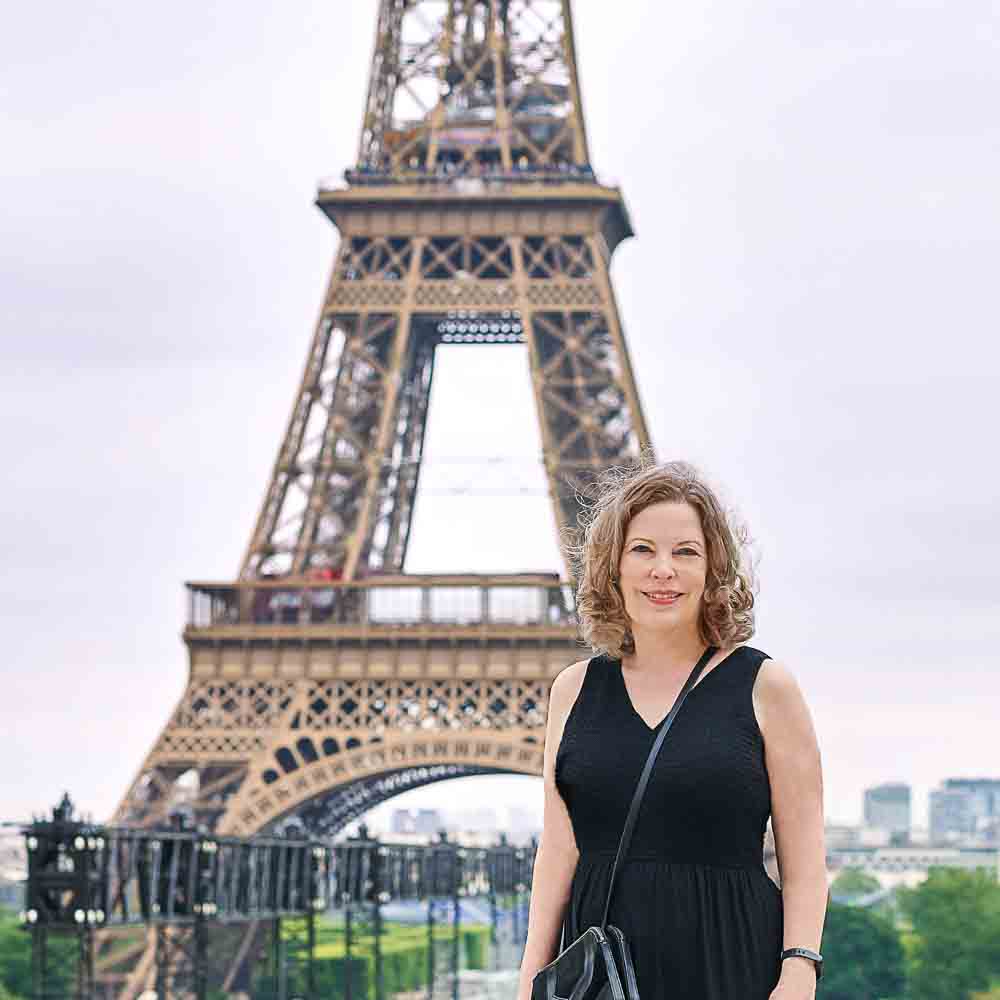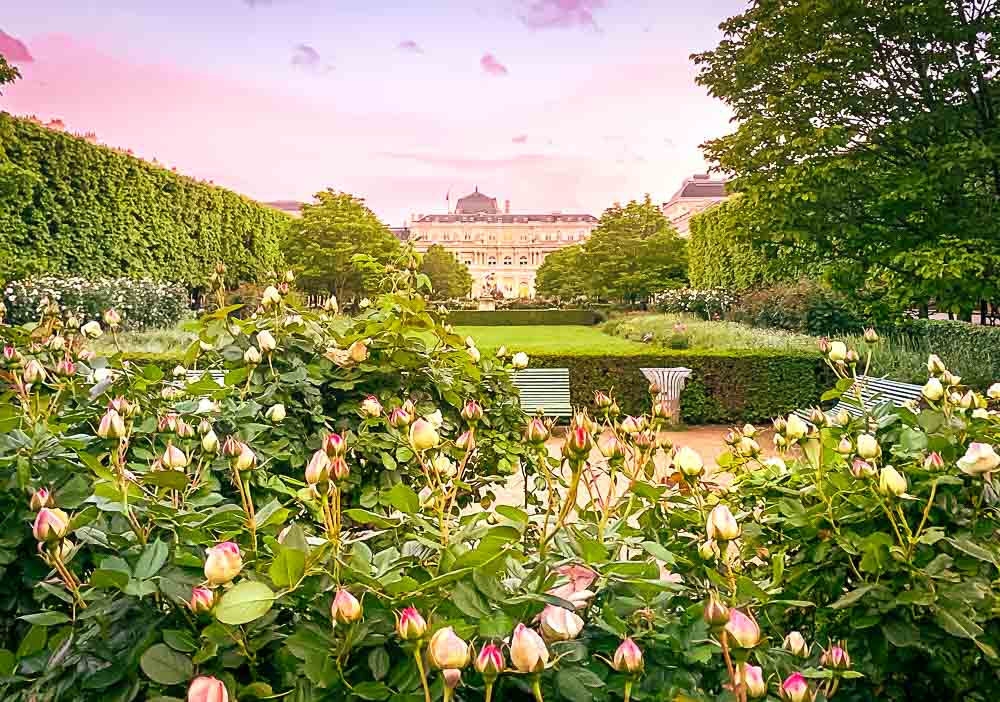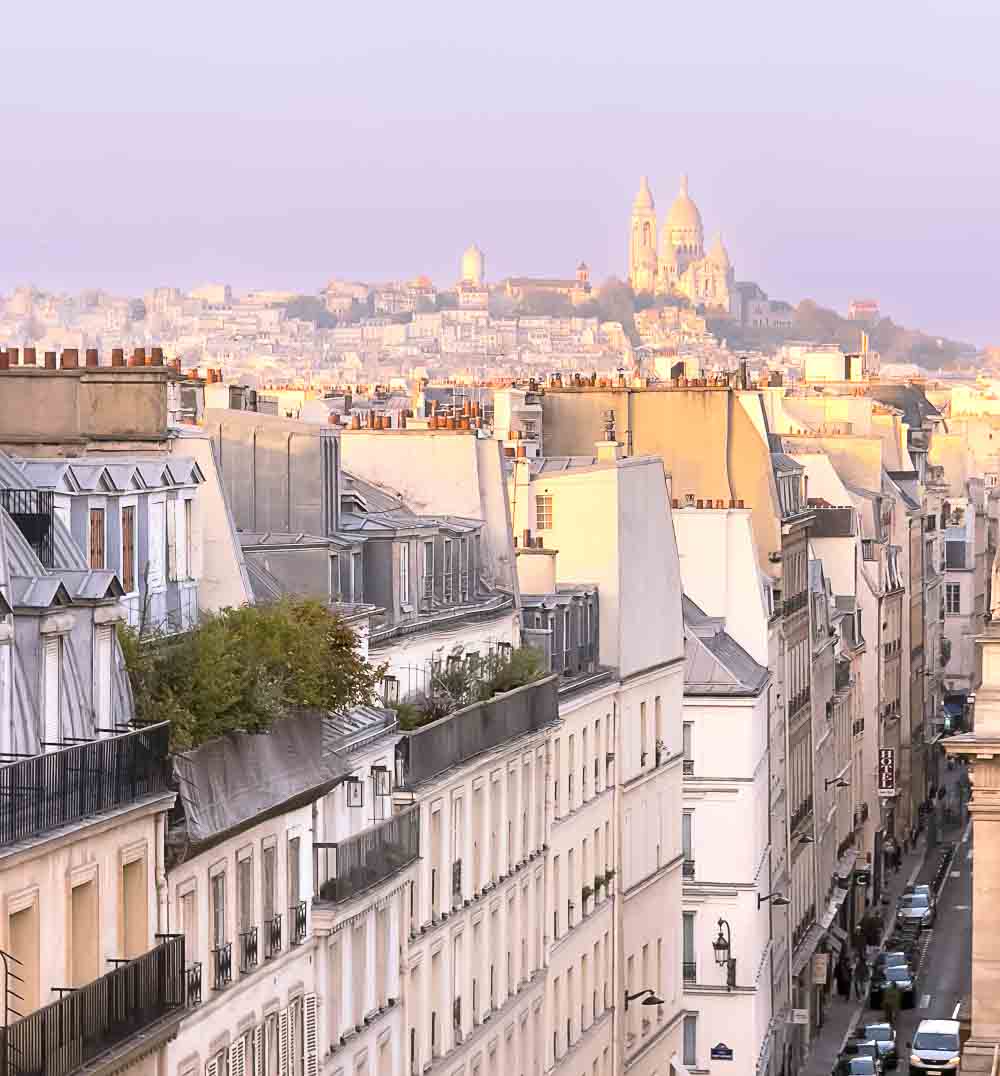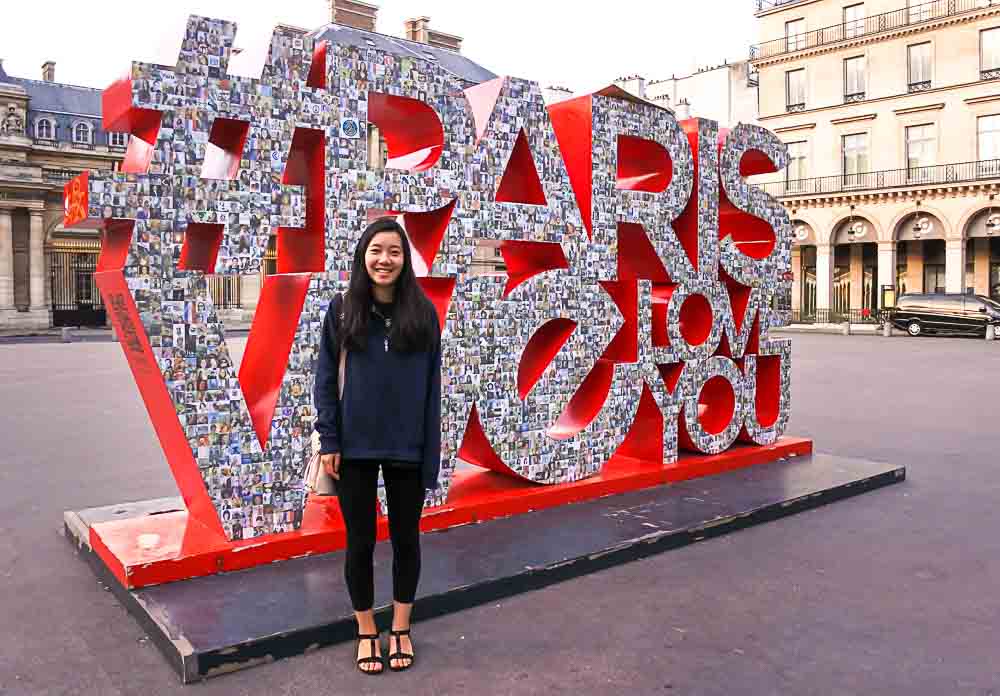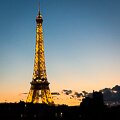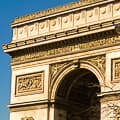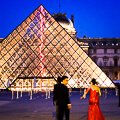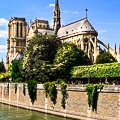Almost at the same moment when late spring arrives in Paris as the days grow longer and warmer, roses burst into bloom through the city, putting on a dazzling display of vibrant colors and wafting their seductive perfume through the air.
Although Paris's beautiful rose gardens experience their first flush of blooms in May and June, the city's relatively mild climate means they start blooming as early as March and continue through December. But to visit them, you know where to find them, which is what I'm sharing in this article.
Paris's love affair with roses dates back to the early 1800s when Joséphine Bonaparte, the first wife of Emperor Napoleon I, created a spectacular rose garden at Château de Malmaison located west of Paris.
Today, you can find magnificent displays of roses in Paris's largest and most famous gardens such as Palais Royal Garden, Luxembourg Garden, and Jardin des Plantes, as well as numerous smaller parks, hidden gardens, and charming lanes and passages.
However, like most visitors, you probably aren't planning your Paris itinerary around seeing the city's rose gardens and, in fact, many of them can be easy to miss unless you know where to look.
So in this article, I'll take you on an online stroll to some of my own favorites near well-known attractions you may be planning to visit anyway - plus a few little-known and hidden gems that I can't resist sharing, including one at a hotel where you can stay on the Estate of Versailles. That way, if you spot a garden you want to see in person, you can easily add it to your itinerary.
We'll start our imaginary journey in a magnificent garden hidden behind a former royal residence, the Palais du Louvre, and finish near another even more famous former home of French kings and queens, the Palace of Versailles.
Admission to all of these gardens is free, except where noted.
Here are the locations you'll find:
- Near the Louvre: Roses at Jardin du Palais Royal
- Secret Rose Gardens in the Upper Marais
- Roses along the Promenade Plantée
- Latin Quarter Rose Gardens
- Famous Rose Garden at Luxembourg Garden
- Musée Rodin Rose and Sculpture Garden
- Roses along Pedestrian Lanes
- An Unexpected Rose Garden near Versailles Palace
If you stop by some of these rose gardens while you're in Paris, I hope you love them as much as I do!
Top photo: Rose blossoms in Square Saint-Gilles Grand Veneur Pauline Roland, a hidden rose-filled oasis in the Marais, (c) Paris Discovery Guide®
Paris Discovery Guide is a reader-supported publication. When you buy through my links, I may earn a small commission at no additional cost to you. Merci beaucoup for your support!
Discover Paris's Romantic Hidden Garden Filled with Roses near the Louvre: Jardin du Palais Royal
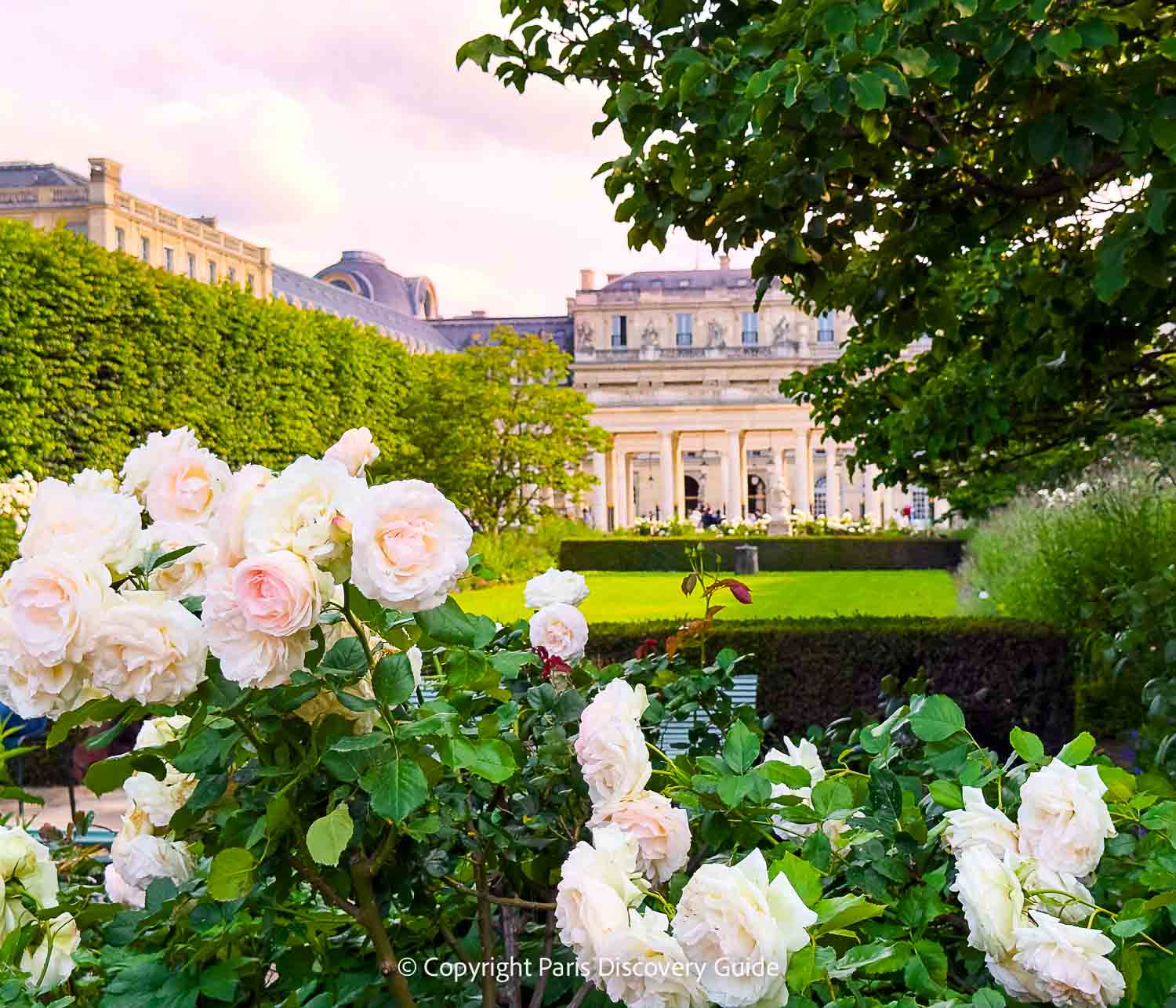
As promised, we're starting our online stroll in Jardin du Palais Royal, an alluringly beautiful but hidden garden across the street from one of Paris's top attractions, the Louvre Museum. But there's a catch.
Buildings totally hide the garden - so unless you know how to find it or you happen to stumble upon it, you'll probably never discover this 5-acre (2 hectare) paradise where the intoxicating scent of roses in full bloom perfume the air.
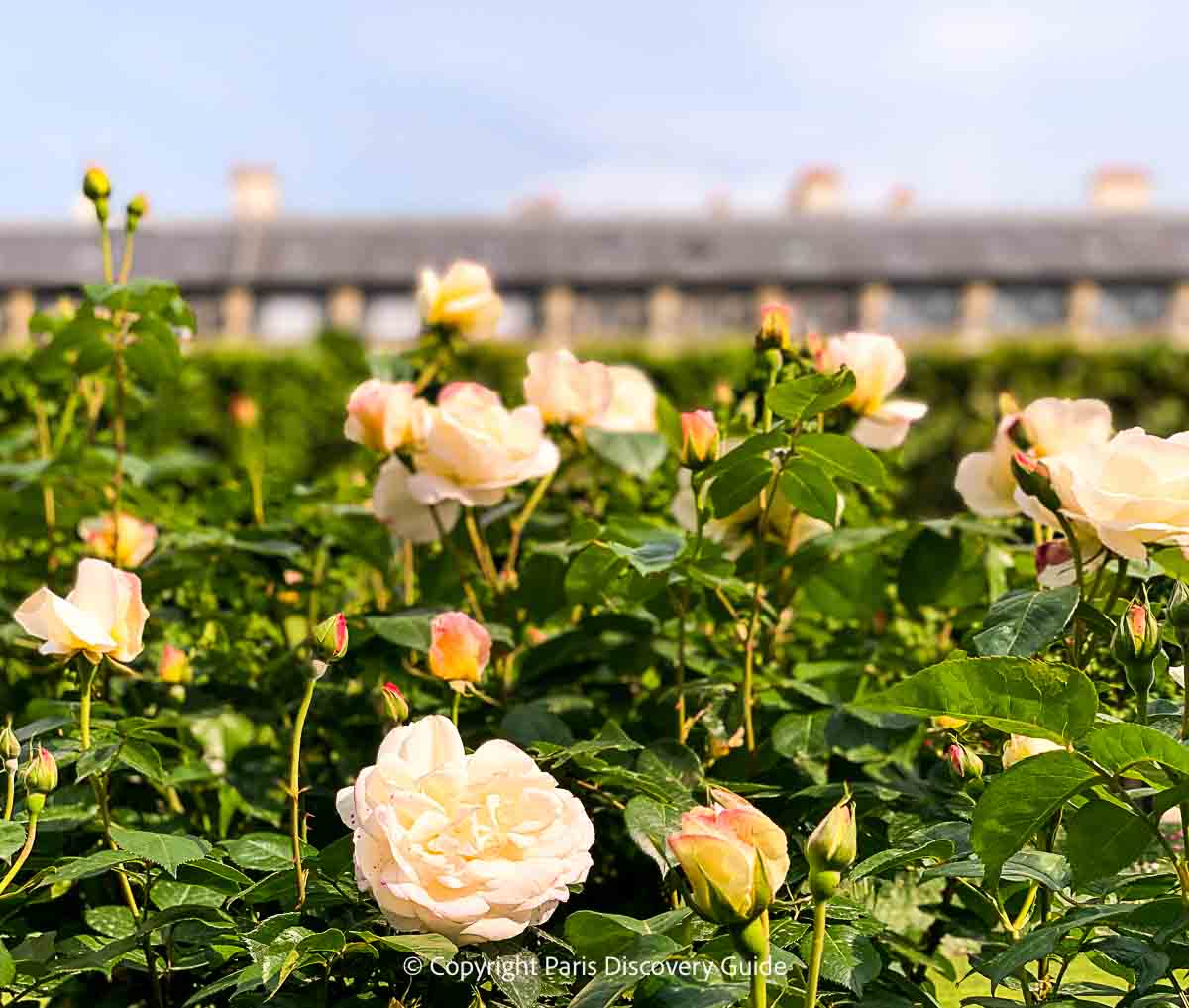
Roses typically start to bloom in Palais Royal Garden in mid-March, usually right after the spectacular magnolia and cherry blossoms begin to fade, and continue through late December and (sometimes) into mid-January.
May and June tend to be the peak months, with another burst coming in September and October.
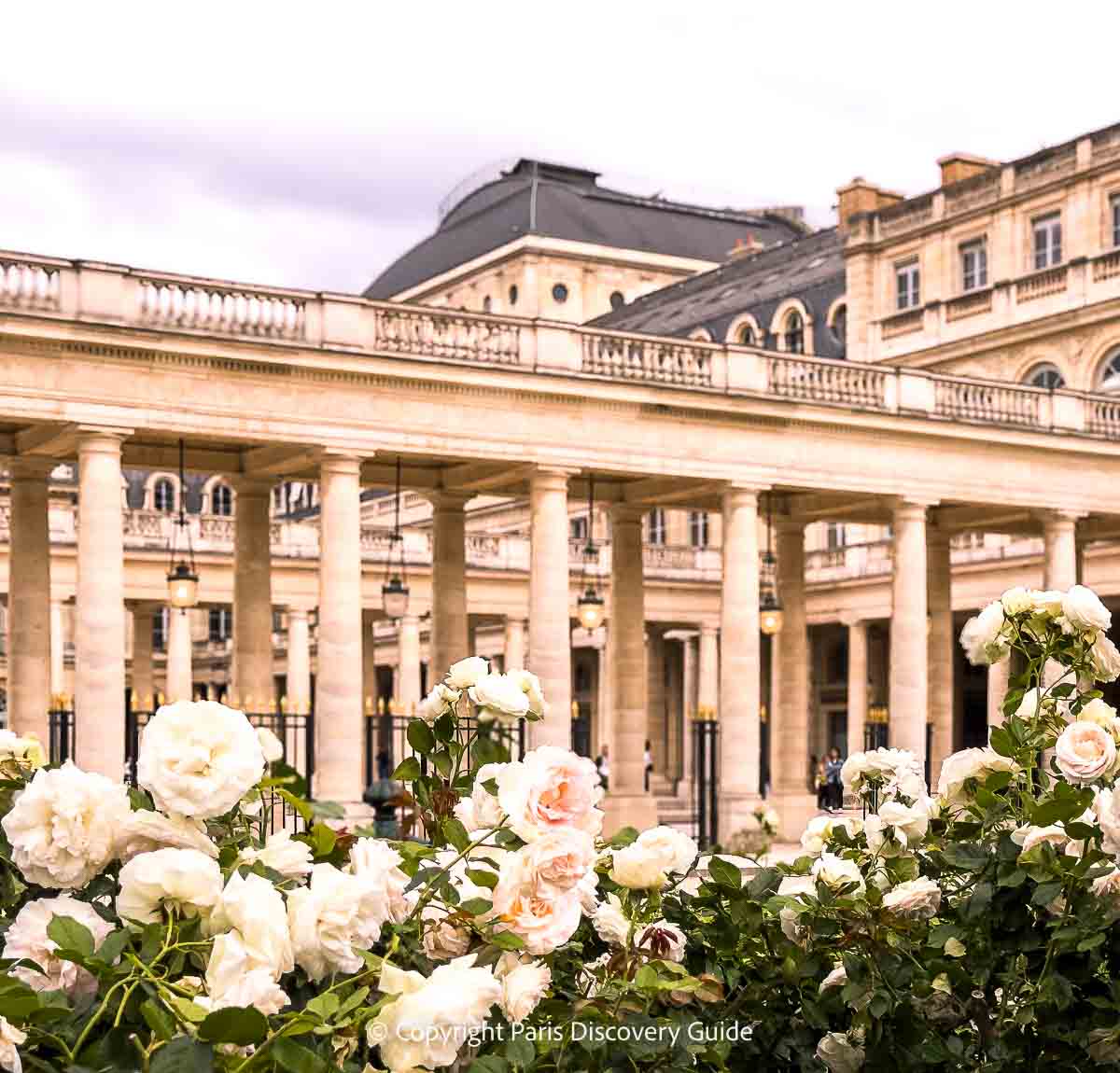
Virtually all of the roses here are "ever-blooming" varieties, and most are climbers, with long, arching canes easily reaching 10-12 feet or more. Bulbs and multitudes of other flowers bloom throughout the season, enhancing the roses' beauty with an ever-changing background of color and texture.
Perhaps the garden's most stunning roses are the pale pink "Pierre de Ronsard" variety (also called "White Eden"), known for their vigor, hardiness, and numerous tightly-clustered petals.
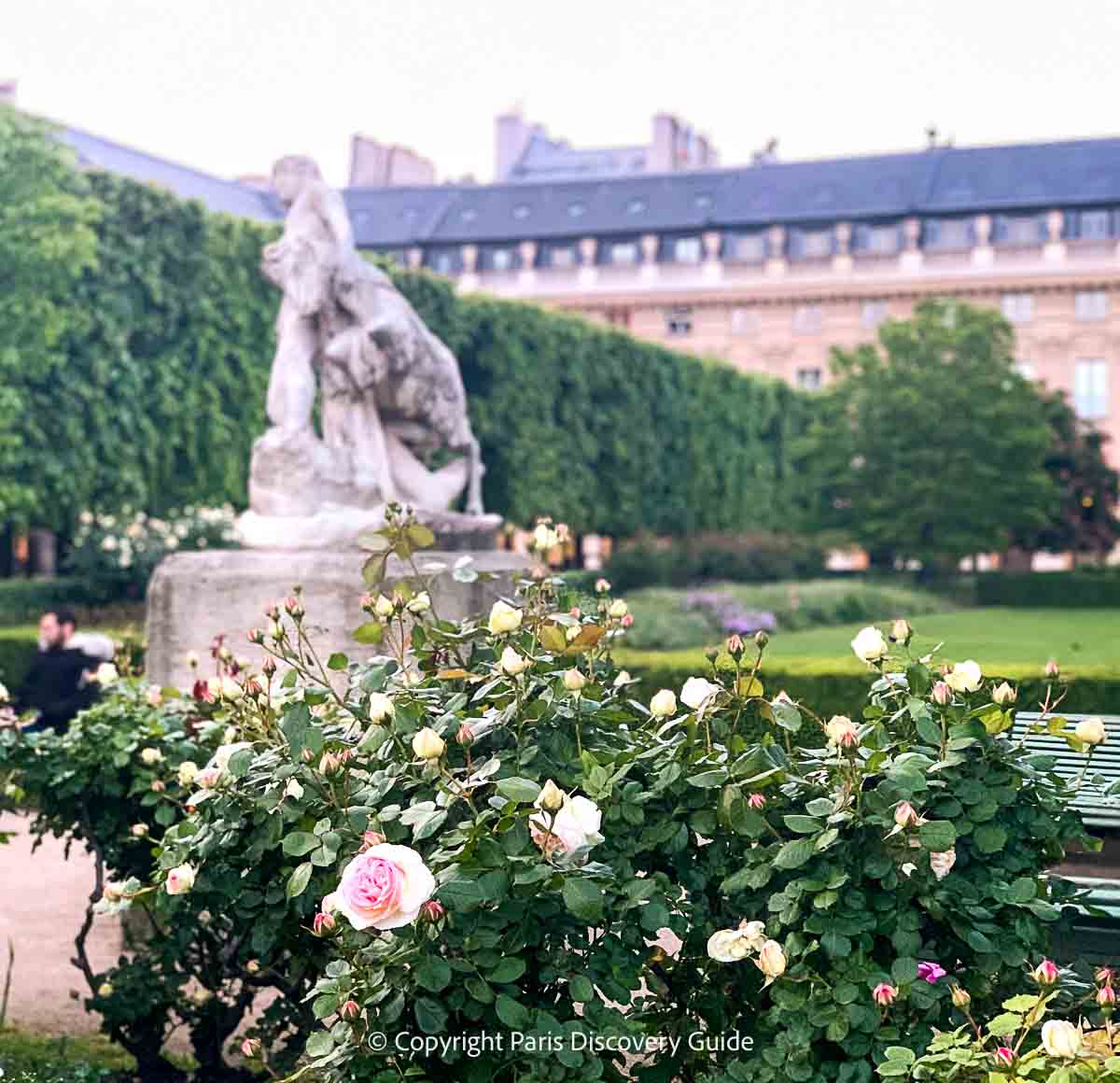
Jardin du Palais Royal dates back to 1633 when Cardinal Richelieu, a rich and powerful religious and civic leader closely aligned with King Louis XIII built himself an ornate palace directly across from the royal residence at the Palais du Louvre, with extensive gardens behind it.
France's Ministry of Culture now occupies the former palace. Although it is normally closed to the public, you can visit during European Heritage Days each year in September when it opens its doors to the public.
The covered arcades (precursors to Paris's 19th century covered passages) surrounding the garden are where the crème de la crème of Parisian society once strolled past shops and bistros while still enjoying glimpses of the garden.
Today, you can still browse through the specialty designer boutiques, jewelry stores, and antique shops (best for window shopping unless you have very deep pockets), enjoy a beverage or snack at Cafe Kitsuné or Muscade, or savor a gourmet meal at Michelin-starred Le Grand Véfour, open since 1784 or Le Restaurant du Palais Royal.
But for most visitors, the garden continues to be the biggest lure.
If you love Palais Royal's pale pink "White Eden" roses...
... you can see more roses by their creator, the family-owned French rose breeding company House of Meilland which started in 1850, at Jardin des Plantes (just look for "Meilland" on the labels). To see their latest dazzling roses, check out the link to their catalog on their website.
Top Paris Attractions near Palais Royal Garden
- Louvre Museum
- Tuileries Garden
- More 1st Arrondissement Attractions
- Palais Garnier (Paris Opera House)
- Les Halles, home to renowned kitchenware stores such as Dehellerin, art exhibitions at the Pinault Collection, and the Rue Montague market street
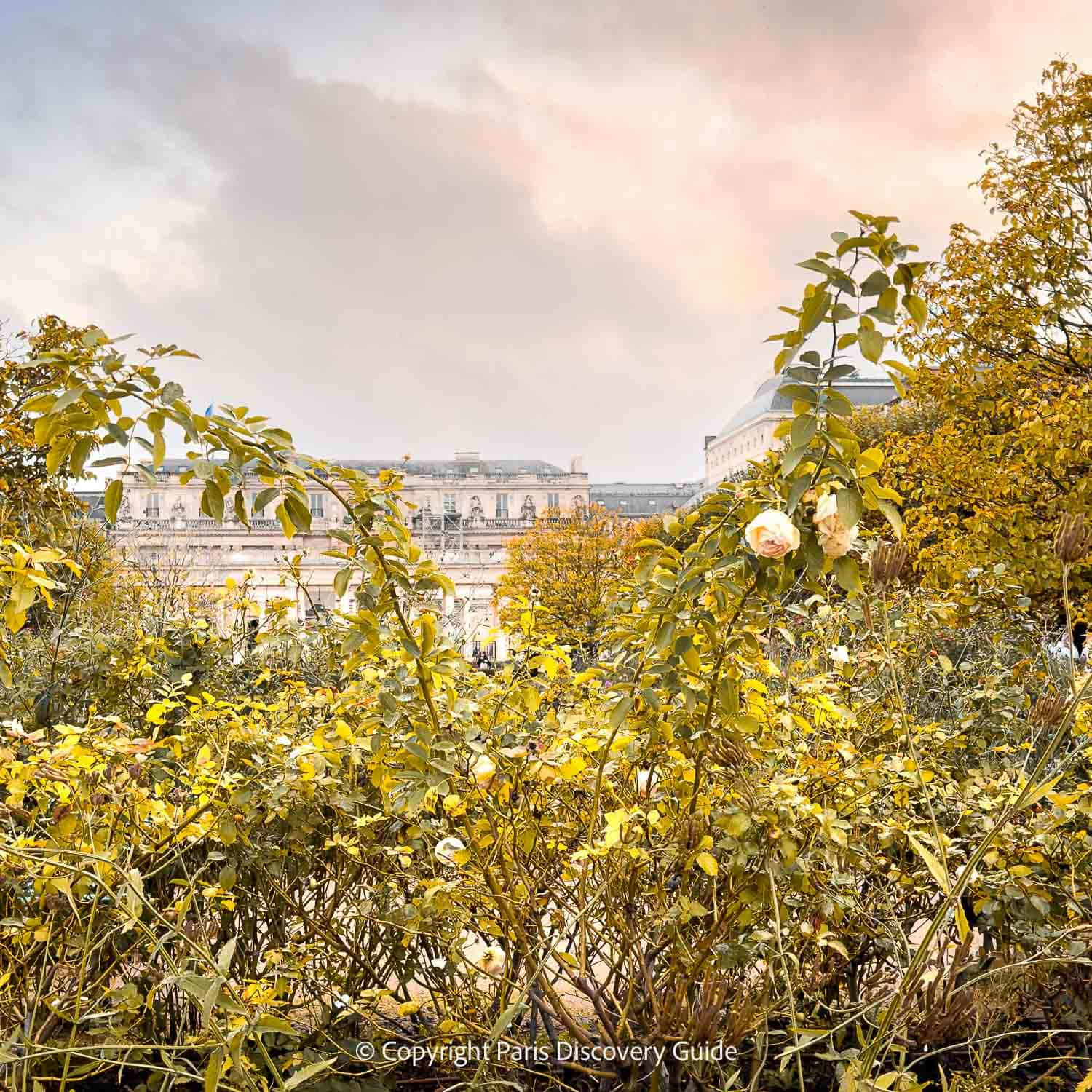
Palais Royal Garden Location
A number of small private passages lead to the garden, but they are not easy to spot unless you already know where they are.
Here are the easiest three entrances to find:
- 8 Rue de Montpelier, 1st arrondissement - Look for a gap in the colonnades where you can walk through to the garden's southwest corner.
- Go to Café Mourner at 2 Place Colette on Rue Print-Honoré across from the Palais Royal/Muse du Louvre metro station. Look for a gap in the colonnades beyond the cafe's outdoor tables, and walk through it. First, you'll be in courtyard with short black and white columns (known as the Burne Columns) with numerous people standing on them and posing for selfies. Walk through that area and a smaller space containing fountains filled with large silver balls beyond it, and you'll reach the garden's south end.
- Go to Le Grand Véfour restaurant at 17 Rue de Beaujolais. The garden is on the other side of the rows of colonnades you'll walk through while reaching the restaurant. However, the Rue de Beaujolais entrance gate may be locked on Sundays and holidays, even when the garden is open.
Palais Royal Garden Hours and Days, Admission Cost
- Days: Normally all, but on Sundays and holidays, you may need to use the Rue de Montpelier or the one near Café Mourner, especially before noon. Op
- Hours: April 1 - September 30: 8am - 10:30pm; October 1 - March 31: 8am - 8:30pm
- Admission: Free
Where to Stay Within a 3-Minute Walk to Palais Royal Garden
- Hotel Moliere - Highly-rated 4-star boutique hotel
- Hotel Montpelier - Popular budget-friendly choice
- Grand Hotel du Palais Royal - Luxurious 5-star hotel
Find Secret Rose Gardens near Specialty Museums in Paris's Upper Marais
This part of our online stroll takes place in the Upper (Saute) Marais neighborhood, which spans a large swath of the 3rd arrondissement and includes numerous small museums, boutiques, and lovely gardens, including several with gorgeous roses.
Our itinerary starts with a totally hidden garden near Centre Pompadour and then continues east in a mostly straight line - an easy walk if you want to explore all four gardens. To visit all four, allow an hour or two, depending how long you might linger in each one.
Jardin Anne Frank - A Small Tranquil Oasis near Centre Pompadour and Museum of Jewish Art and History
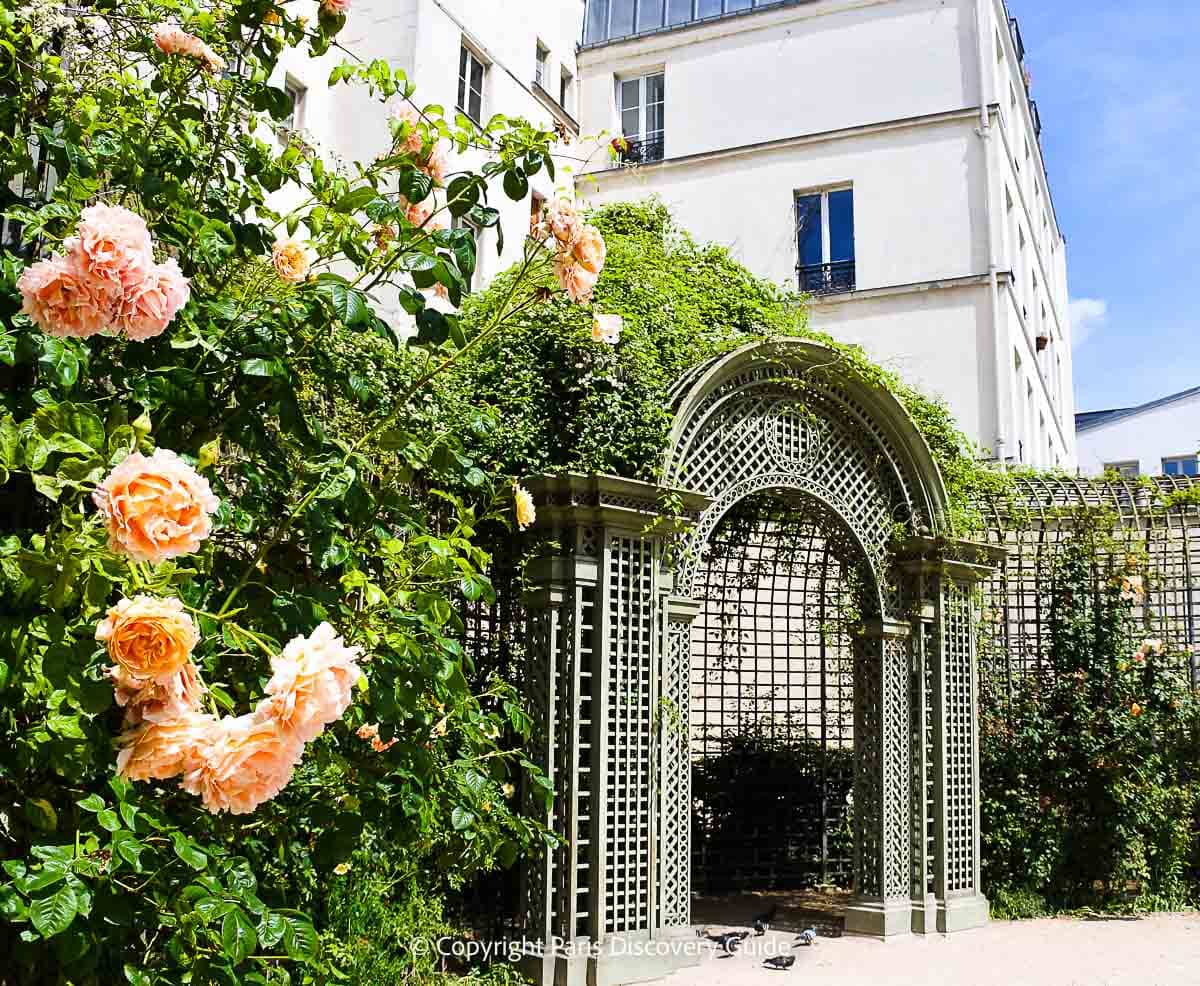
Although Jardin Anne Frank's location near the edge of the bustling Beauregard neighborhood surrounding Centre Pompadour (currently closed for renovations until 2030) seems anything but serene, once you turn down a winding path between buildings leading to the garden, you'll leave all the street noise behind.
The small community garden is almost fully enclosed by the walls of surrounding buildings, including the back of the Museum of Jewish Art and History a block away on Rue due Temple. Its name honors and commemorates Anne Frank, a young Jewish German girl who died in a Nazi concentration camp during World War II.
Explore Le Marais' Jewish history & culture on a guided walking tour
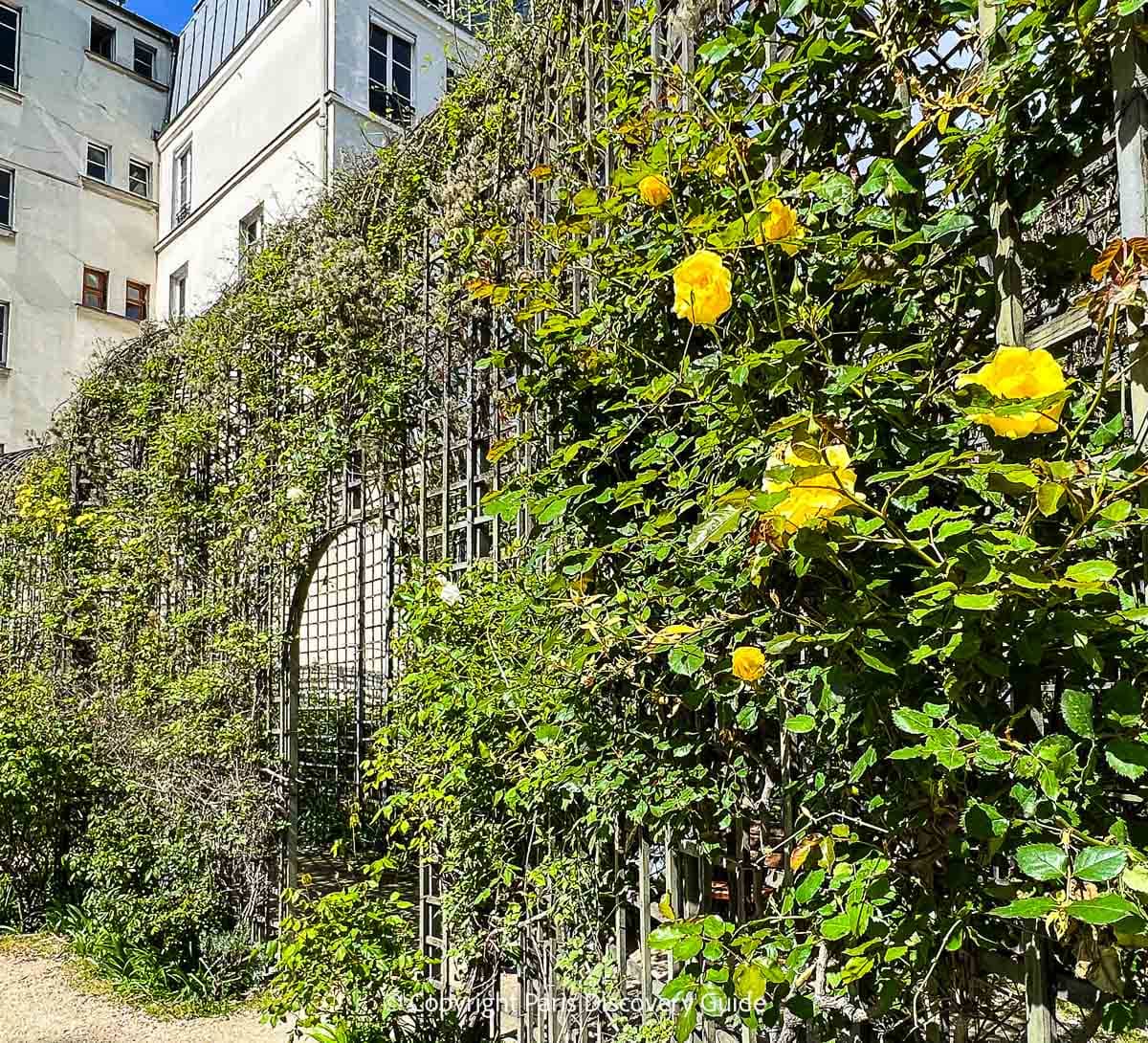
After you pass through an outer courtyard with a couple of tables for playing games and anchored by a chestnut tree grafted from a tree outside the secret annex where Anne Frank she and her family hid from the Nazis for over two years, you'll come to a series of two small enclosed gardens.
The first features rose-covered arbors sheltering benches where you can site and contemplate their beauty. In the second, which includes more benches plus a small children's play area, cherry trees put on an ethereal display of pink and white blossoms in March and early April.
Several varieties of roses cover the arbor, which ensures that you'll find at least some (and usually many) rose blossoms throughout most of the year - although the cherry blossoms steal the show in early spring.
Anne Frank Garden Location
Address: 14 Impasse Bertha, 75003; Metro: Perambulate
Open: Usually daily including public holidays, 10am - 8pm (winter), 9pm (summer); I have found the passage to it barricaded on a couple of seemingly random occasions.
Also nearby: Although Centre Pompadour is closed for renovations until 2030, the surrounding neighborhood including the Stravinski Fountain is fun to explore. If you're a jazz lover, check out the clubs on nearby Rue des Lombards.
The National Archives' Hidden Garden
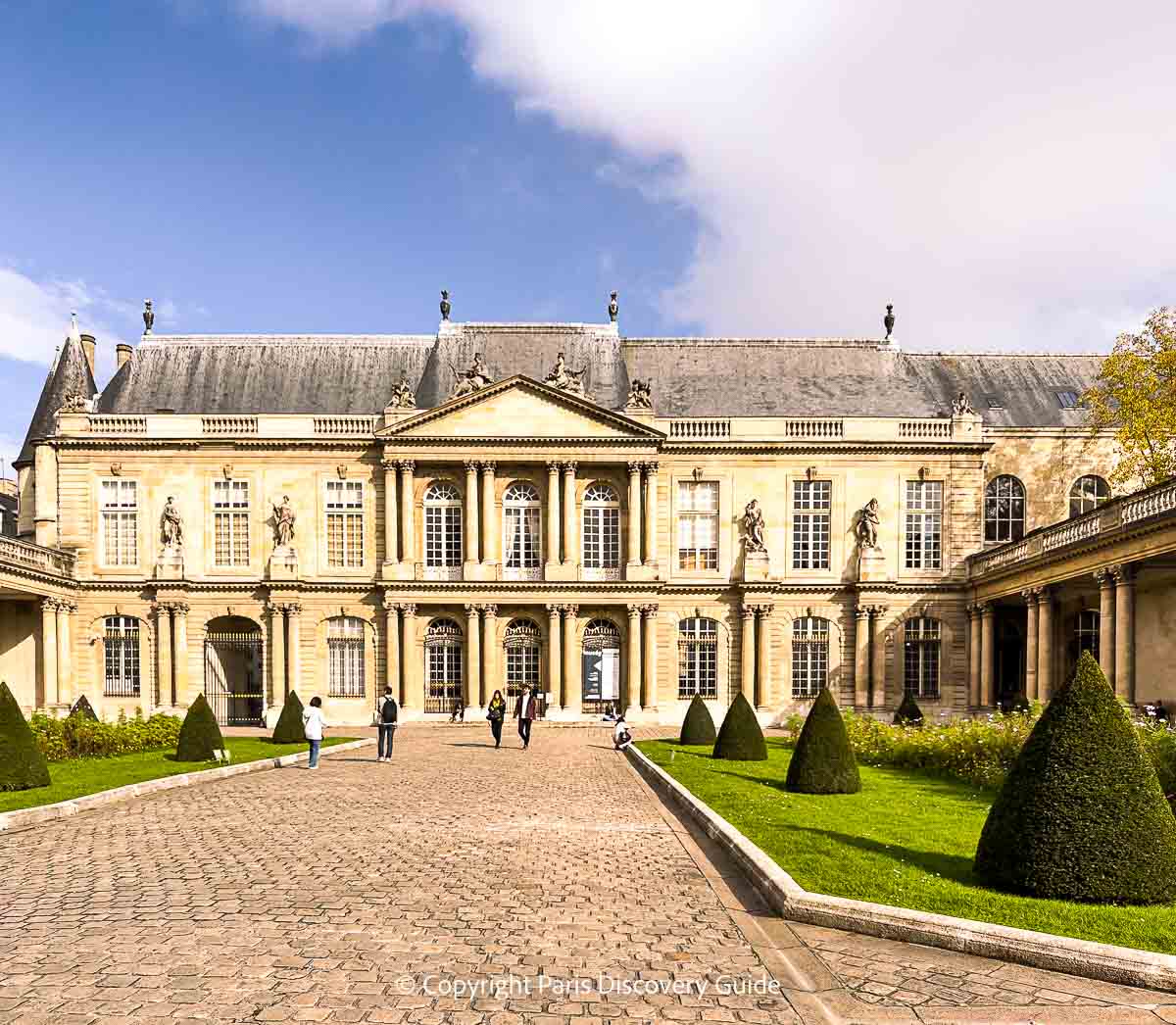
When you first pass through the turreted 14th century medieval gateway entrance to Paris's Musée des Archives Nationales, it's easy to mistake the beautifully maintained formal plantings of carefully trimmed yews and `flower beds dotting a verdant lawn for the museum's acclaimed garden.
However, that's just the front courtyard - the actual garden isn't in sight. To find it, walk toward the back corner of the colonnaded wing on the right. Just as you become convinced that you've somehow missed it, you'll see a bit of light streaming through a small gap between the columns.
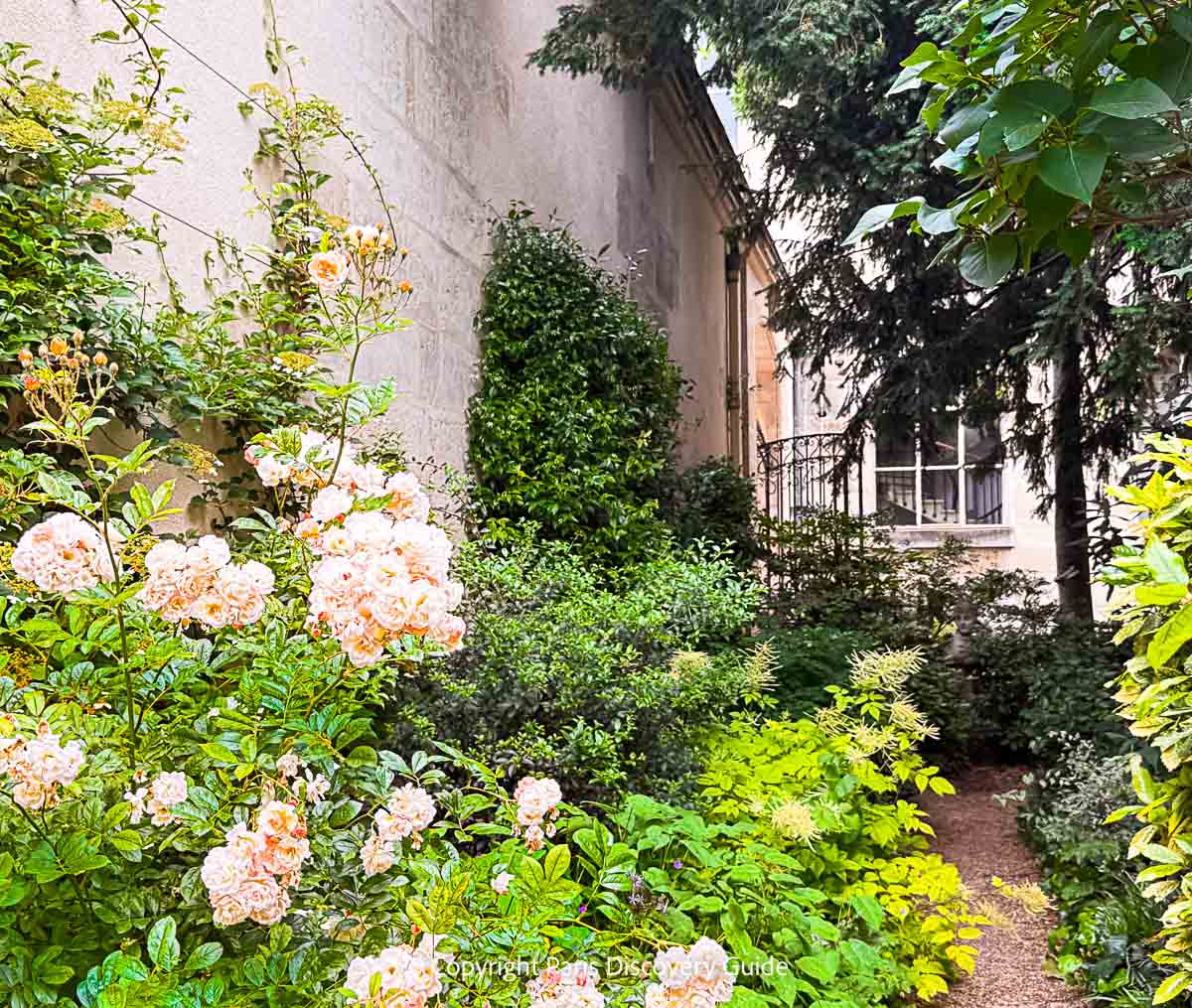
Walk through a short passage, and you'll be rewarded with a series of informal garden "rooms" created from the back gardens of adjoining mansions. Meandering paths, a gurgling brook, reflective pools, and a profusion of colorful blossoms lure you through each space.
As you explore the garden, which is far larger than it appears at first glance - in fact, several times the size of the formal courtyard you first walked through - look for roses climbing up the sides of the surrounding buildings and sprawling from their base, soaking up the heat and sun.
Claim an empty bench, and hear the sound of birds singing in the trees.
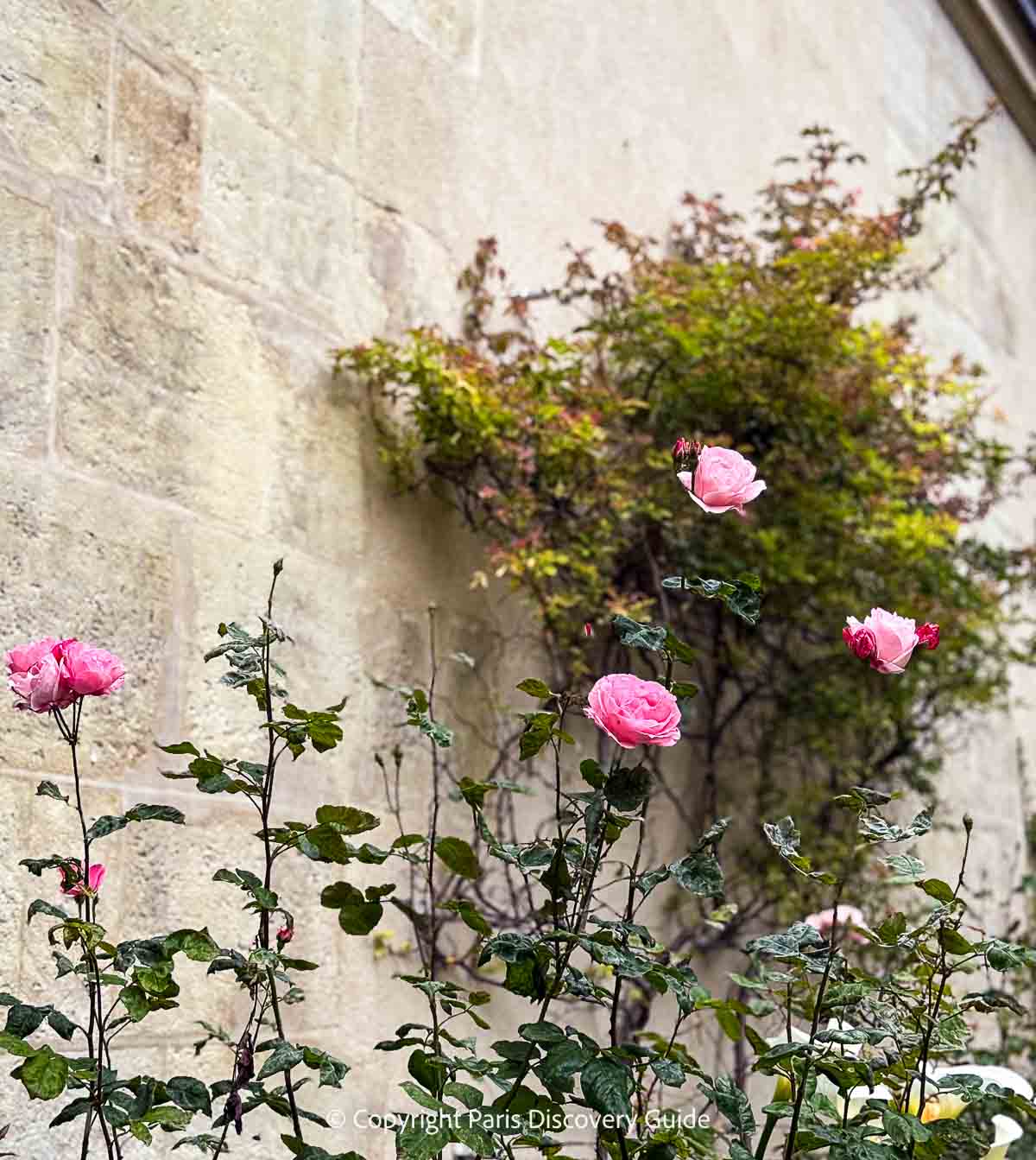
National Archives Garden Location
Address: 60 Rue des Francs-Bourgeois, 75003; Metro: Perambulate
Open: Daily, 8am - 5pm (winter), 8am-5pm (summer); Metro: Perambulate
Nearby: Musée Picasso
Yellow Roses in Square Georges-Cain
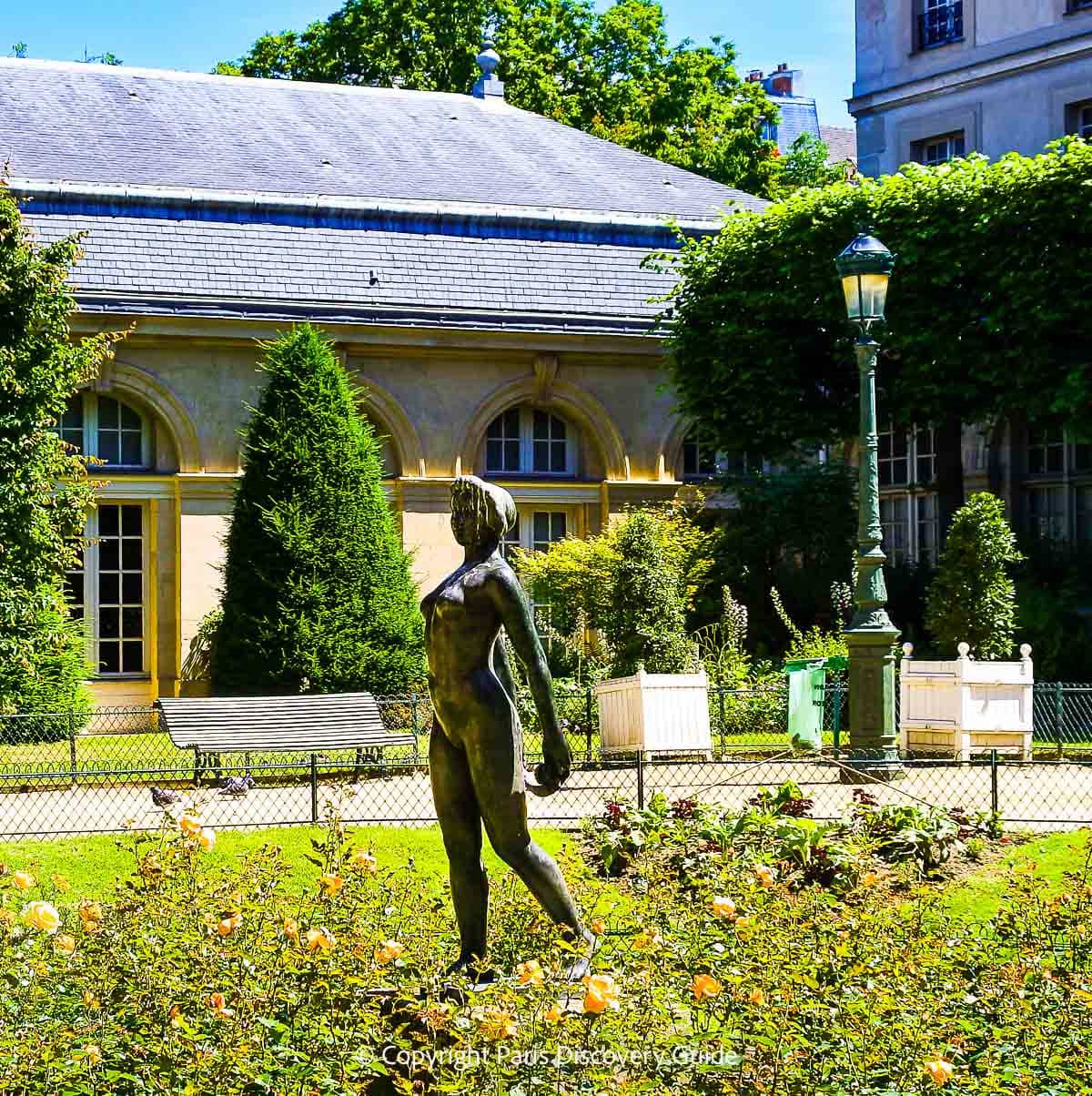
Once you leave the National Archives Garden, turn left, and continue walking along Rue des Francs-Bourgeois for two blocks. Turn left again onto Rue Payenne.
What makes Rue Payenne special are the four small parks and gardens along this one short block.
While you can enjoy roses in all of them, the display I love the most is in the Square Georges Cain garden, where golden yellow roses fill a circular bed surrounding a bronze sculpture of a woman called "Ile de France" which French artist Aristide Maillol created in the 1920s.
If the sculpture you see here among the roses looks vaguely familiar, that may be because it's one of a number of casts made by Maillol as he made minor tweaks to perfect his vision of what it should be. You can see others in Tuileries Garden across from the Louvre, Musée Maillol in the 6th arrondissement, several museums in the U.S., and no doubt other locations.
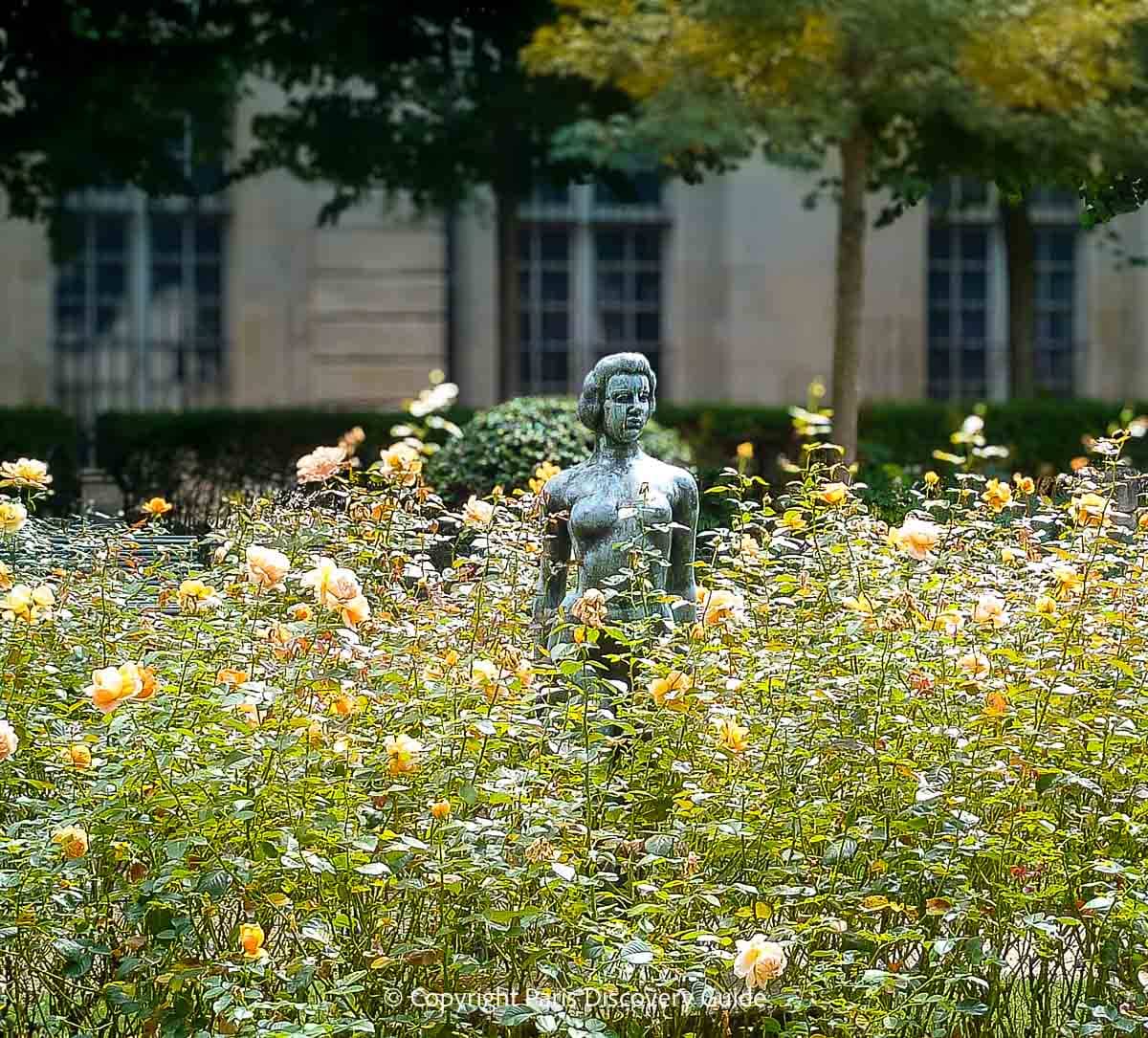
While you're on Rue Payenne, you can also explore the other gardens along this block, visit the nearby Musée Picasso or Musée Carnavalet and stop for a snack or meal at small cafes you'll pass.
Square Georges Cain Location
Address: 8 Rue Payenne, 75003; Metro: Saint-Sebastien-Froissart or Chemin Vert
Open: Daily, including public holidays, 8am - 5:30pm (winter), 8am-8:30pm (summer)
Also nearby: Numerous galleries and boutiques in this part of the Saute Marais, especially along Rue de Turenne, Boulevard Beaumarchais, and all the tiny side streets that you'll happen upon as you walk around the neighborhood.
Discover Square Saint-Gilles - A Hidden Paris Rose Garden Paradise
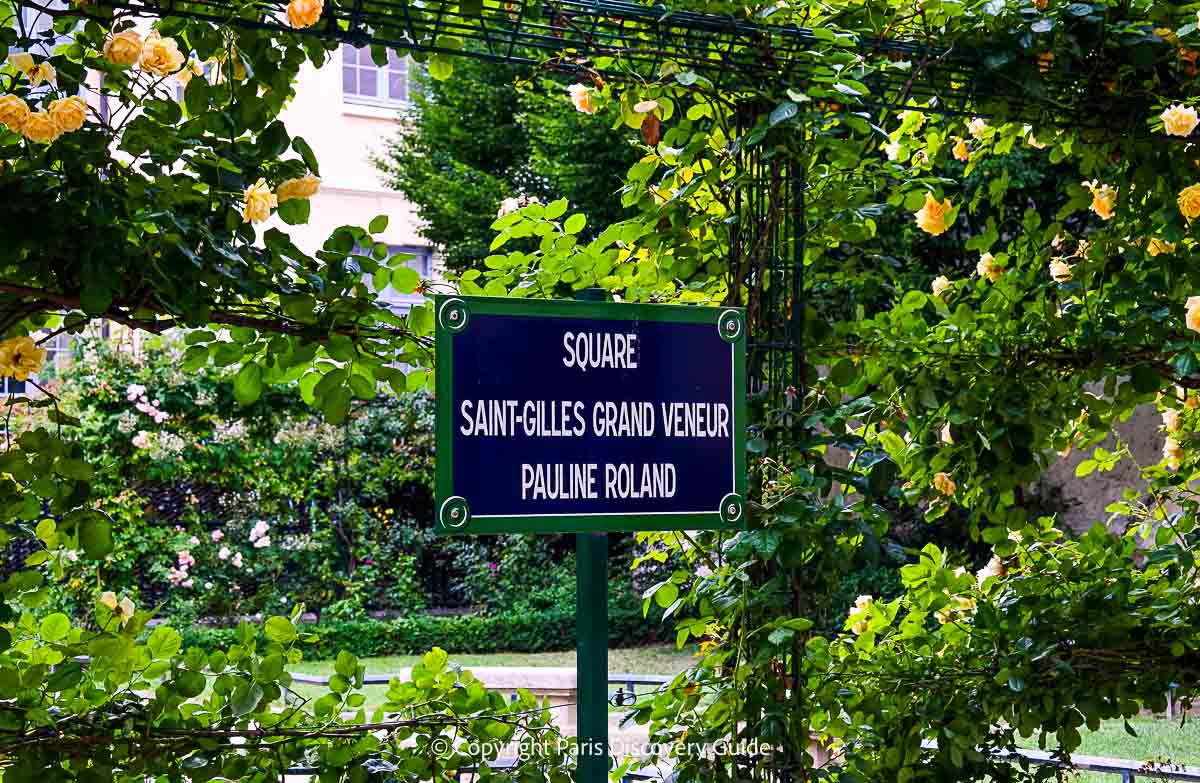
The final stop on our virtual itinerary through the Marais is Square Saint-Gilles Grand Veneur Pauline Roland (yes, that's a mouthful but it goes by simply Square Saint-Gilles). Even though it covers barely a quarter of an acre, it's one of Paris's most magnificent rose gardens, loved especially for its year-round beauty and seclusion - a true hidden gem.
It also rivals the National Archives Garden, Jardin du Anne Frank, and a few others in this article for being hard to find.
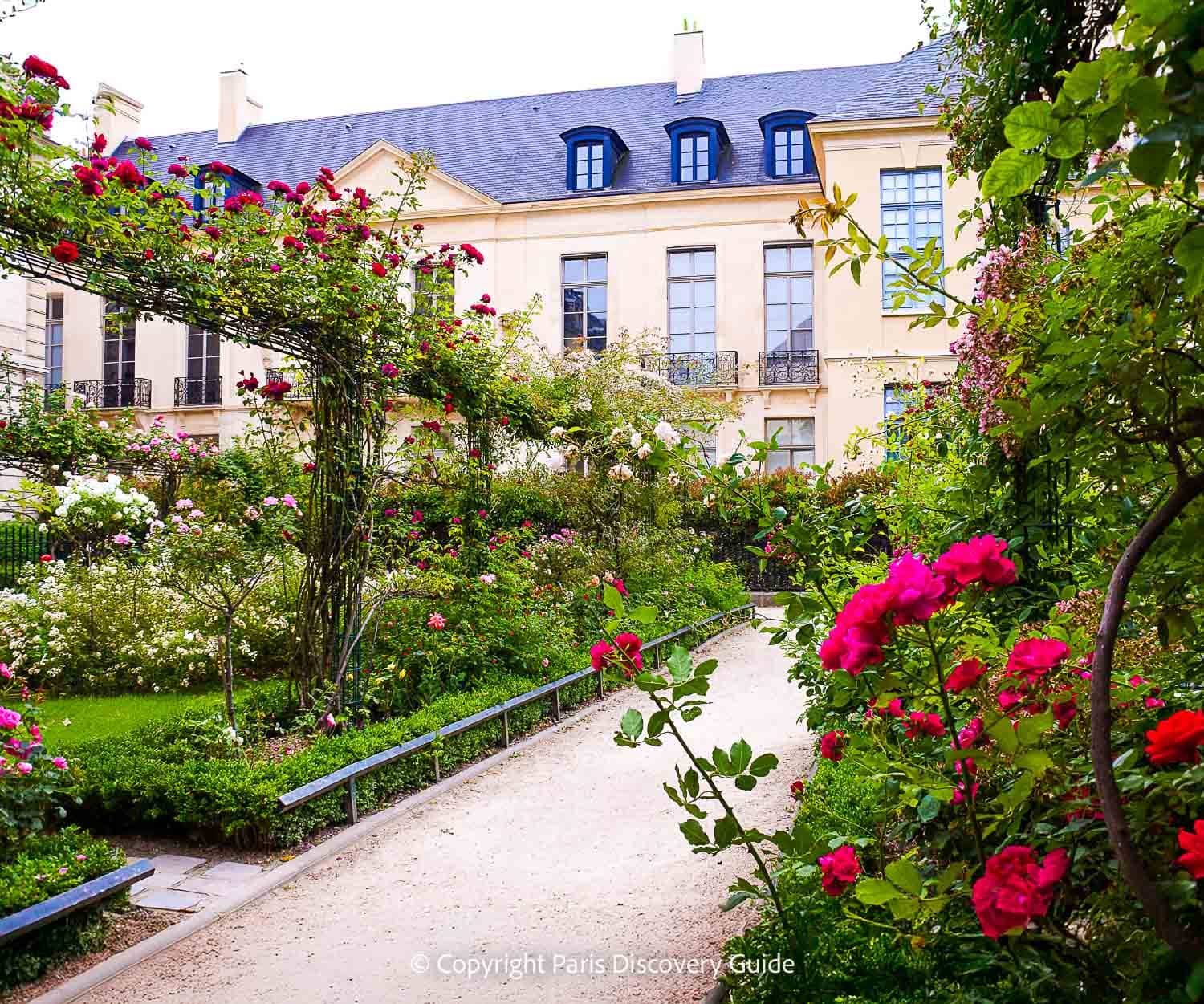
If you're coming from Square Georges Cain, continue walking east on Rue des Francs Bourgeois for a block and then turn left at Rue de Turenne, then turn right on Rue Villehardouin.
When you reach an apparent dead end, turn left and walk up pedestrian-only Rue Hesse and at its end, go around a metal barrier that seems to suggest you're about to trespass onto private property.
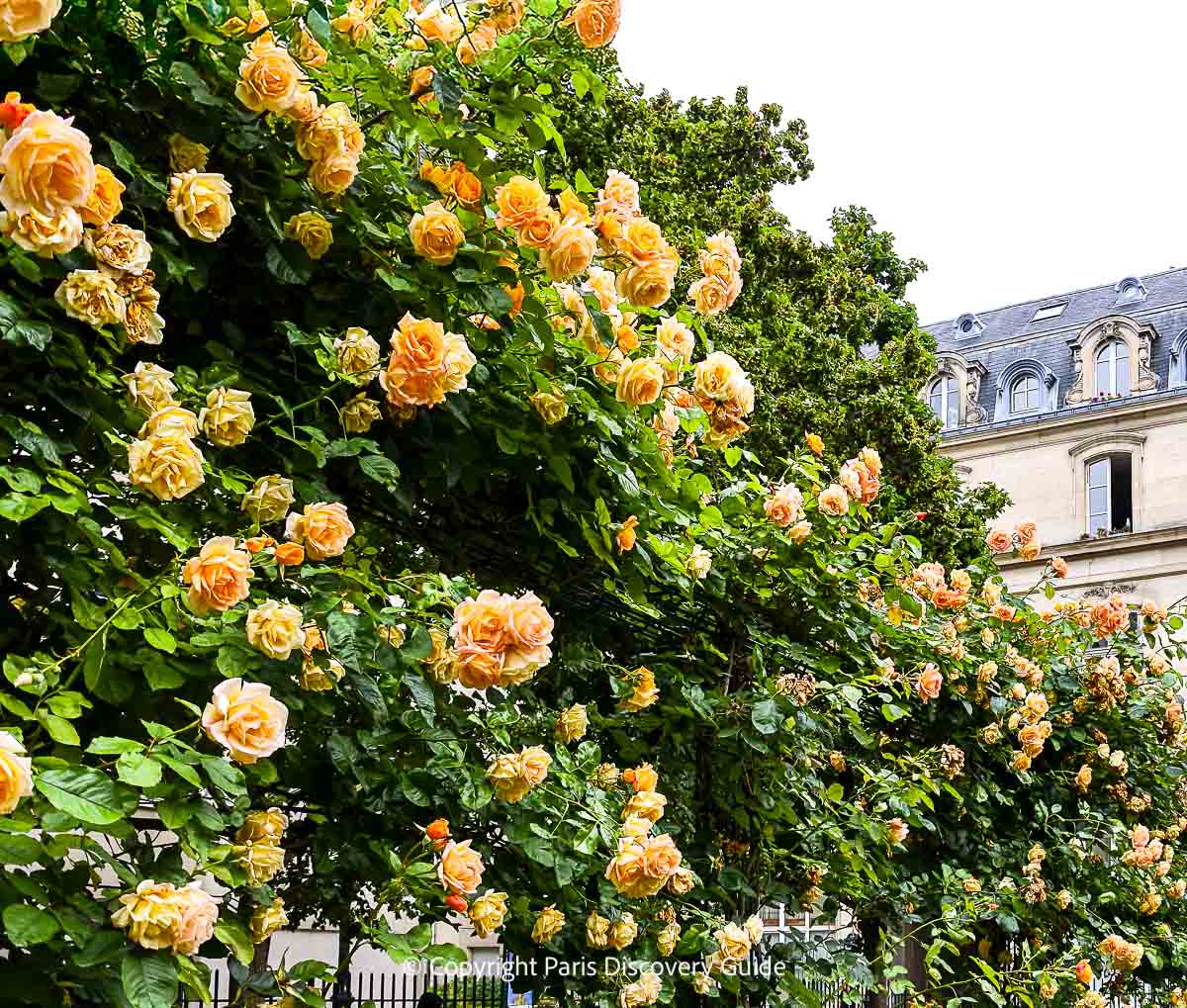
You're not - the garden is municipally owned, and after another short walk, you'll spot it (and a sign with its full name) on your left and, most importantly, the formal French-style garden overflowing with a profusion of climbing roses.
The City of Paris created the garden in 1988 in a space once occupied by a much older garden surrounded on three sides by Hôtel du Grand-Veneur, a private mansion built in 1637 and now the site of contemporary art exhibitions. (You can spot it's entrance at 30 Rue de Turenne).
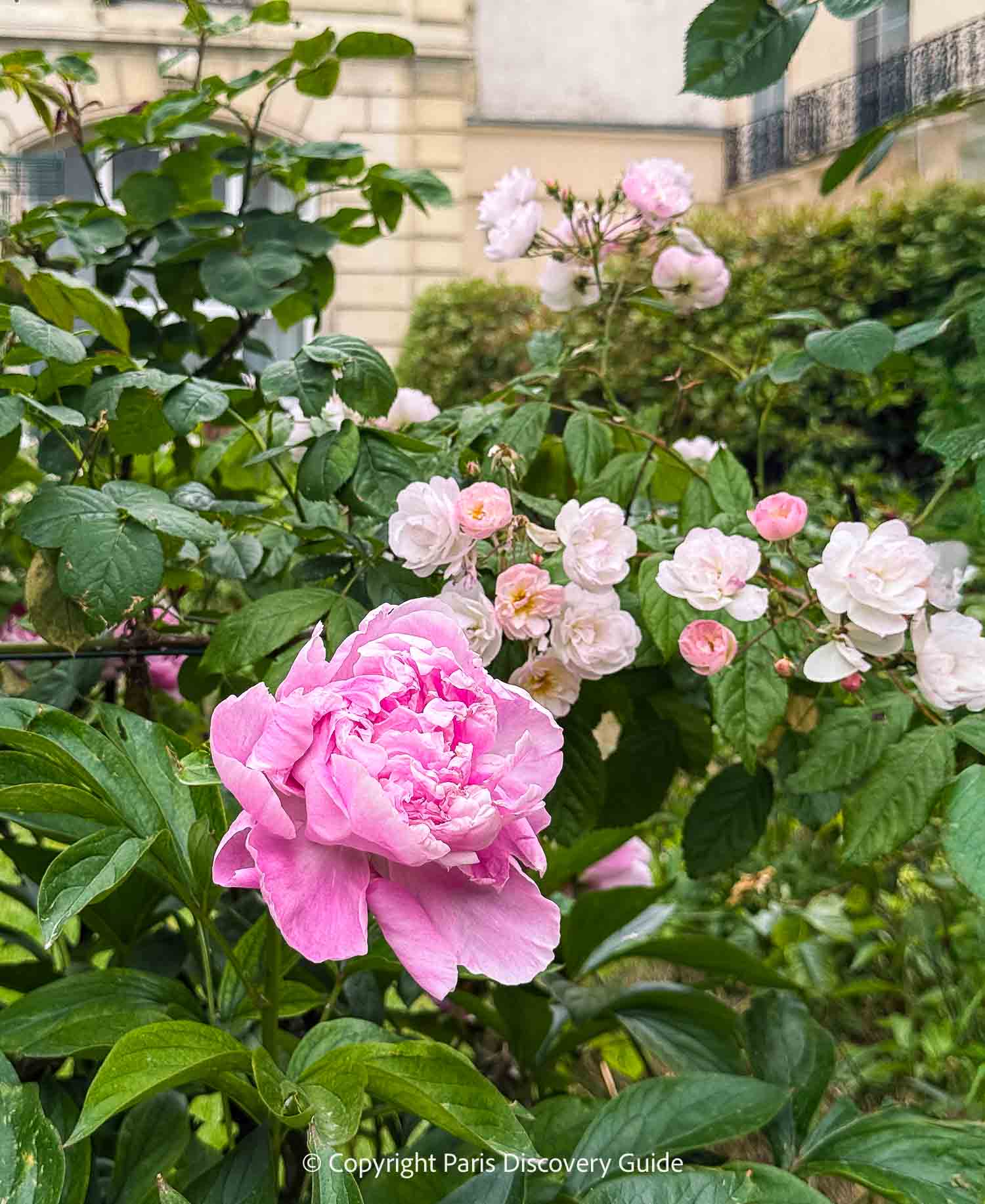
The 17th century mansion's beautiful architecture, mellow stone walls, and graceful maple trees form the perfect backdrop for the garden, a peaceful and private oasis in this busy part of the city.
The garden's design consists of five "rooms" separated by gravel paths. Along the paths, you'll find stone and wooden benches for relaxing and contemplating the garden.
Planting beds filled with flowering bulbs and perennials as well at tall metal arbors to support the roses line the perimeters of each garden space.
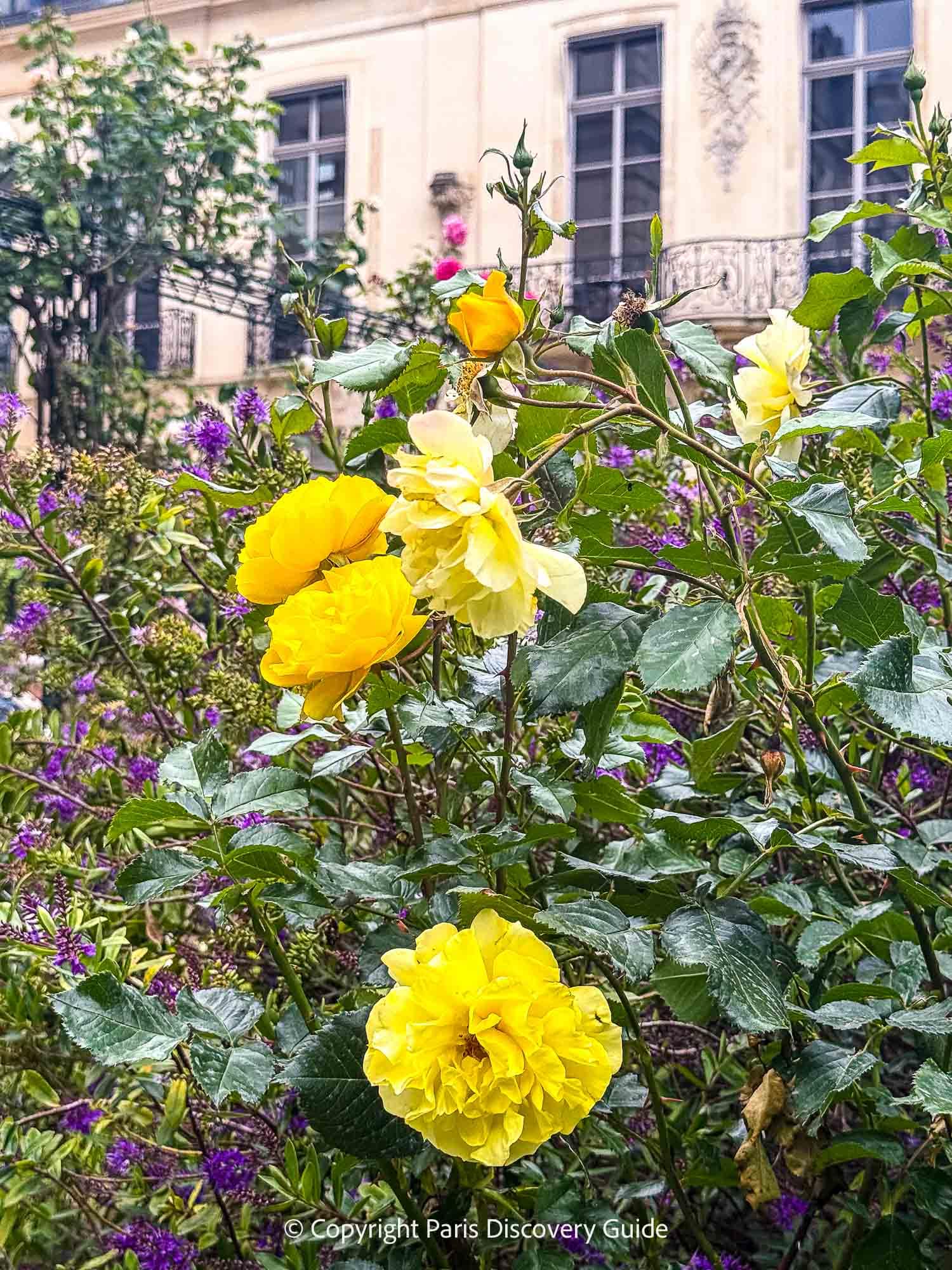
Grassy lawns fill the centers of the beds. In the afternoons, you'll sometimes see a group of neighborhood teens sitting on the grass after school and talking quietly. Occasionally you'll also notice a neighborhood cat stretching in the sun.
Overhead, you'll hear the murmur of songbirds, occasionally broken broken by the loud caw-cawing of resident territorial crows who have claimed this garden as their own.
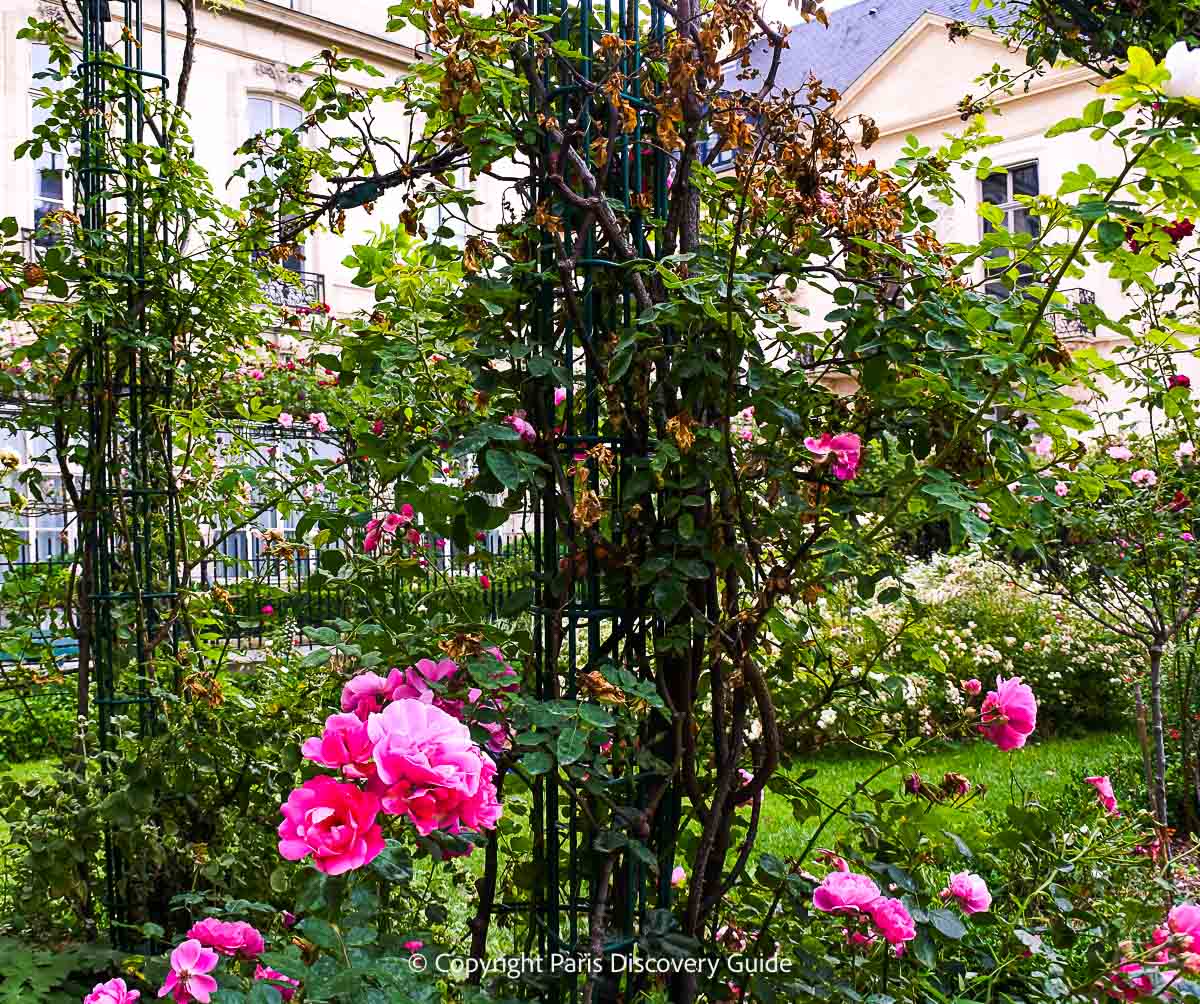
Although the garden is mainly at rest during January and February with winter-flowering hellebores providing the main source of color, you can spot the first bulbs and early perennials in bloom during March as the new season's leaves begin to emerge from the rose bushes.
Although I've occasionally seen early rose blossoms during late March, the roses usually don't start blooming in earnest until early/mid-April when the garden's peonies are also in full flower.
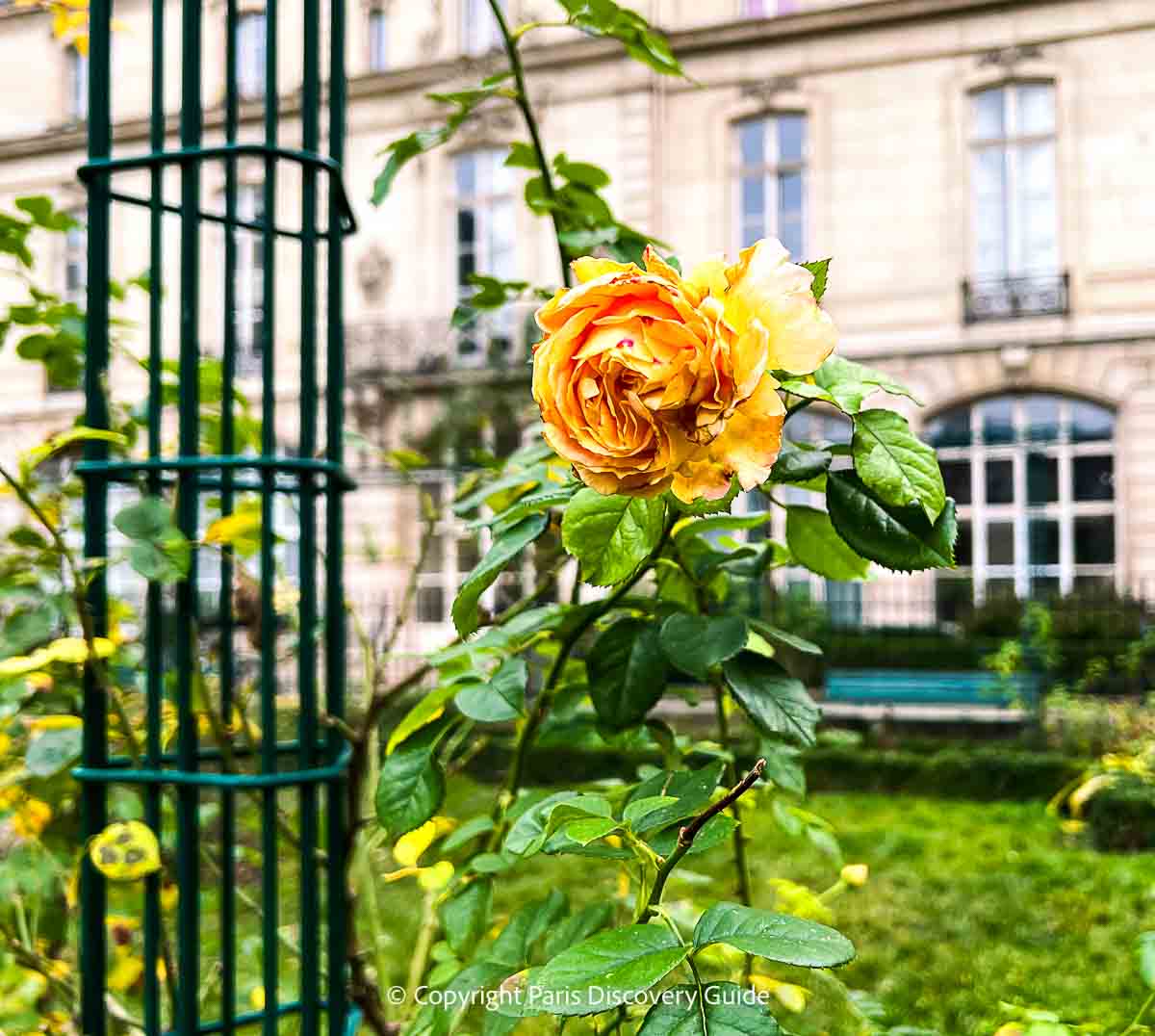
During May and June, roses as well as other perennials fill the garden with color and perfume the air, and the roses continue in abundance through most of the fall.
By December, usually only a few roses continue to bloom - but their scarcity makes them especially precious.
In case you haven't already guessed, the Square Saint-Gilles garden is one of my favorite places in Paris and on my walking route every time I visit.
Square Saint-Gilles Location
Address: 9 Rue du Grand Veneur (described above) and (in my opinion, slightly trickier to find) on Rue des Arquebusiers), 75003; Metro: Saint-Paul or Chemin Vert
Open: Daily, including public holidays, 8am - 5:30pm (winter), 8am-8:30pm (summer)
Nearby: Musée Picasso, Musée Carnavalet (no ticket required); free admission), and countless galleries, boutiques, small cafes, and coffee bars
Promenade Plantée - Roses along Paris's Most Beautiful Walk
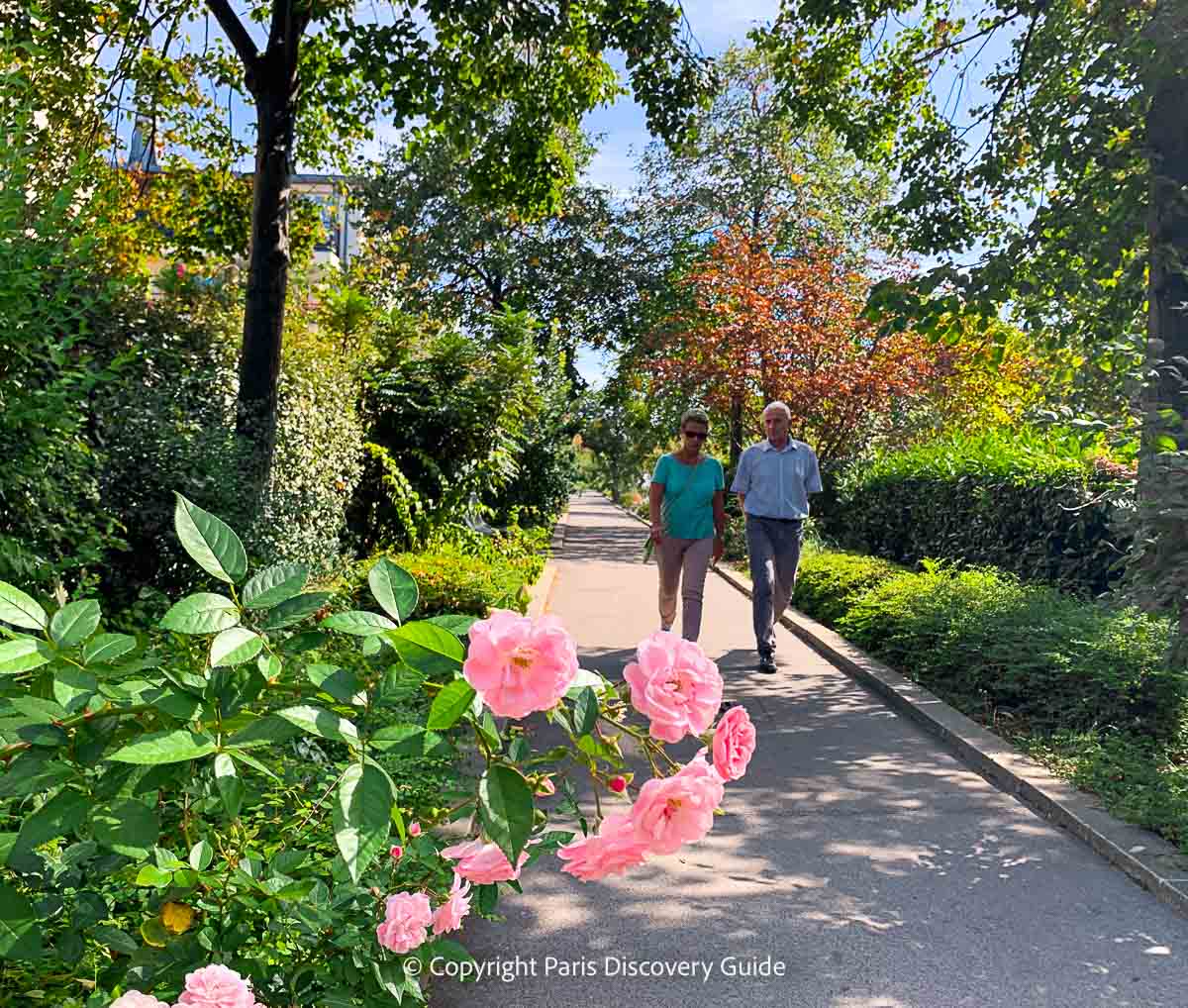
If we were doing this rose garden stroll in real life, after leaving the Square Saint-Gilles garden, we'd walk east to Boulevard Beaumarchais, turn left and go down to Place de la Bastille, and walk across or around the plaza. Head past Opera Bastille (the large modern-looking gray building southeast of Place de la Bastille) and go down Rue de Lyon to Avenue Daumesnil where signs point to the staircase leading to Coulée Vert René-Dumont, also called Promenade Plantée.
When Promenade Plantée opened atop an abandoned railway in the late 1980s, it became the world's first elevated urban linear park. It stretches almost three miles (4.7 km) to the Périphérique, the multi-laned highway surrounding the city. From most street-level locations, you don't even know it's there, although it does descend to ground level in a few spots.
But what makes this park so special are the beautiful trees, flowers, reflecting pools, trellises, and city-scape vistas that you'll see as you walk along it.
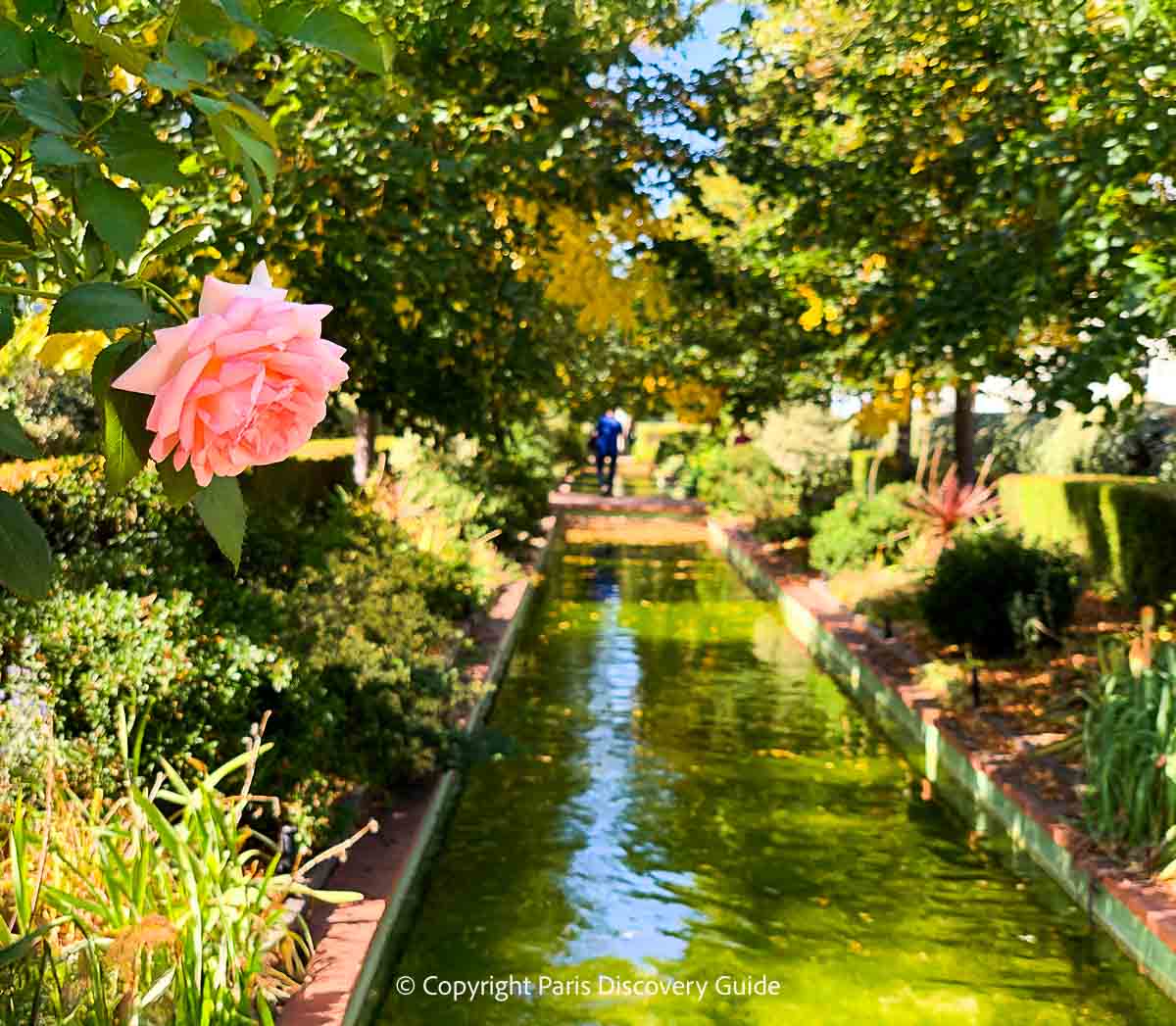
Beautiful roses put on a splashy display among the many flowers you'll see here. Large climbing roses reach over the arches and trellises, while smaller shrub roses provide blocks of color and even function as a ground cover in some places.
Now that almost four decades have passed since Coulée Verte opened, the trees have grown tall and the roses and other plants have matured to become a harmonious tapestry, with the roses providing the most consistent splashes of color and scent throughout most of the year.
Visit from early spring through December, and you're likely to see roses in bloom.
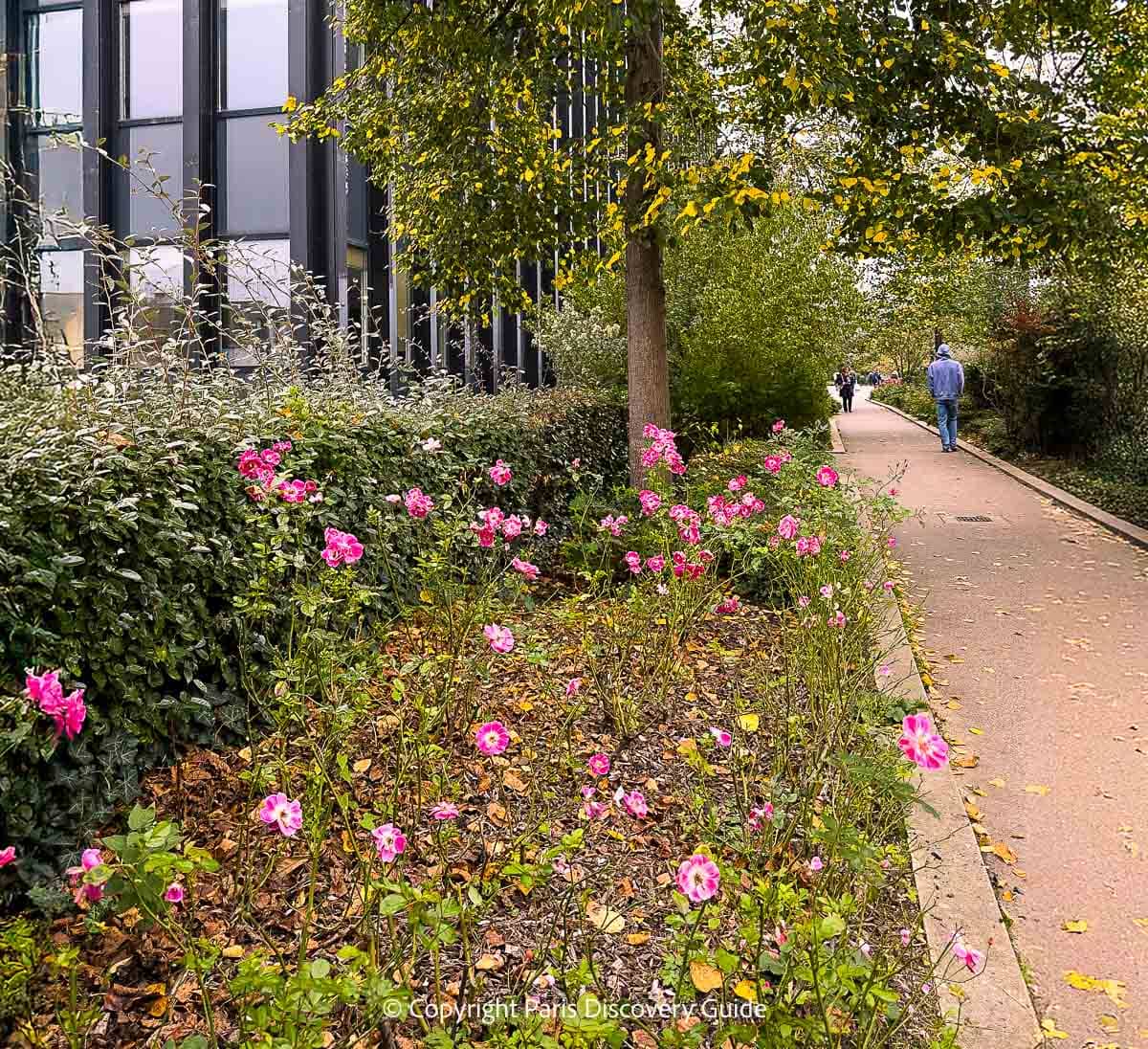
Promenade Plantée Address and Visitor Information
Address of Main Entrance: 1 Coulée Verte René-Dumont, 75012 (use this address to see the location on your phone; otherwise, use the directions above to find it; Metro: Bastille or Ledru-Rollin
Open: Daily, 7am - 9:30pm (summer) and 8am - 5:45pm (summer)
More to visit nearby: In addition the cafes around Place de la Bastille, check out Jardin du Port de l'Arsenal, a linear park along the east side of the portion of Canal Saint-Martin south of Bastille; browse the Rue d'Aligre flea market; and just beyond the nearby Gare de Lyon train station, visit Ground Control (81 Rue du Charolais), a cool and slightly quirky food hall/events/activities/social venue
Experience Roses in Bloom in Latin Quarter Gardens
The next stops on our Paris rose garden tour include two special gardens located within a couple of blocks of each other in the southeastern corner of the Latin Quarter on Paris's Left Bank.
The first is a true hidden gem - an interior courtyard garden at the Grande Mosquée de Paris - while the other is a dedicated rose garden in Paris's famous Jardin des Plantes.
Both are within easy walking distance from other popular Latin Quarter attractions such as the Pantheon, the Rue Mouffetard market street, and Arenes de Lutece, the ancient Roman arena totally hidden behind buildings along Rue Monge.
See Roses Blooming in the Hidden Garden at Mosquée de Paris
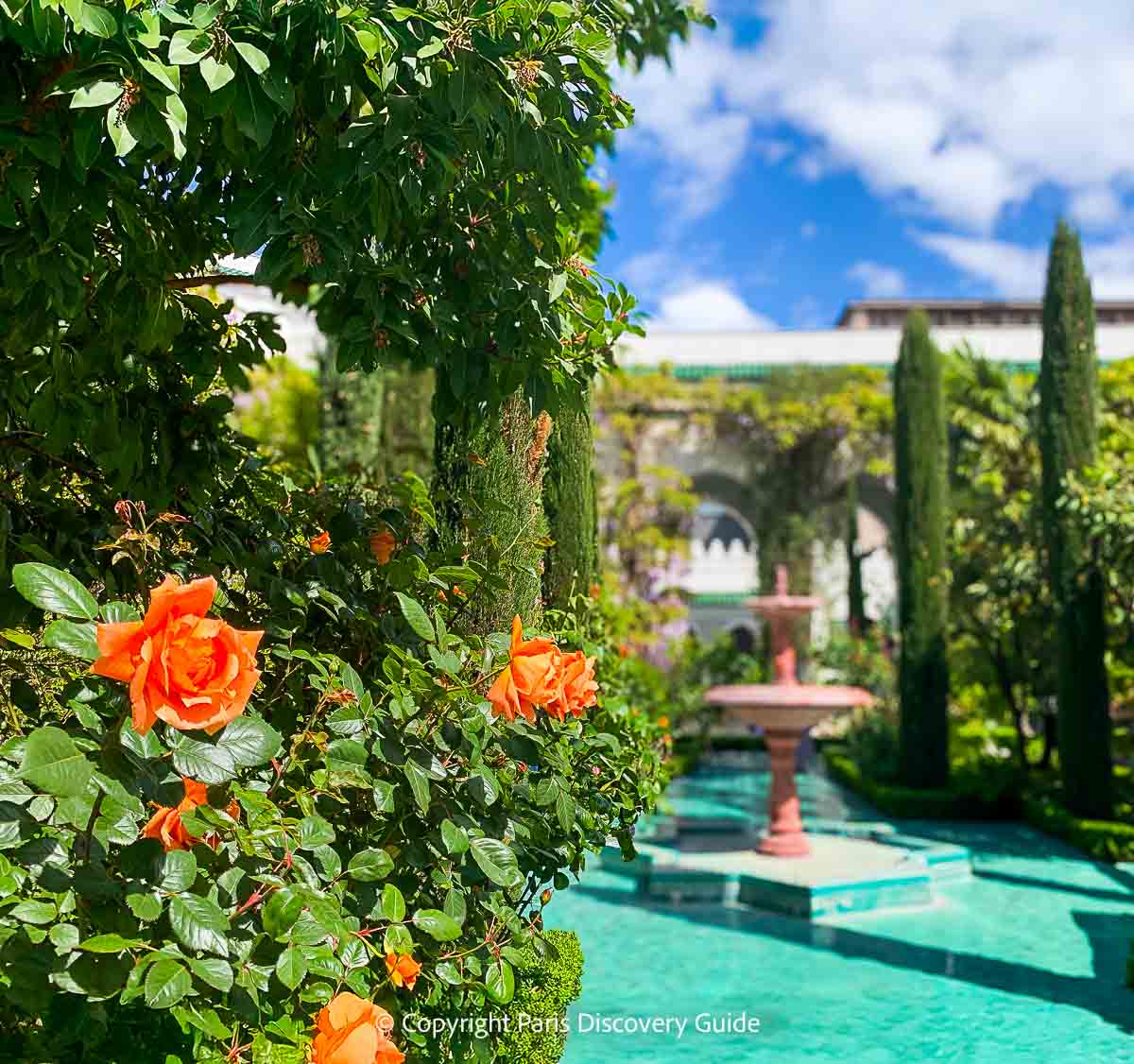
The Grande Mosquée de Paris is both a place of worship and Islamic studies - and due to the timing of its construction following World War I, a tribute to the 800,000 Muslims from North, West, and East Africa who fought to defend France during the Great War. It's also where you can see beautiful roses in a tranquil garden hidden from sight.
During World War II, the Grande Mosquée played an active role in the clandestine Résistance by sheltering downed British parachutists as well as local Jewish families and refugees.
The mosque also provided the parachutists with forged documents to identify them as Muslim if they needed to stay in Paris, and helped those who could leave to escape Nazi-occupied France.
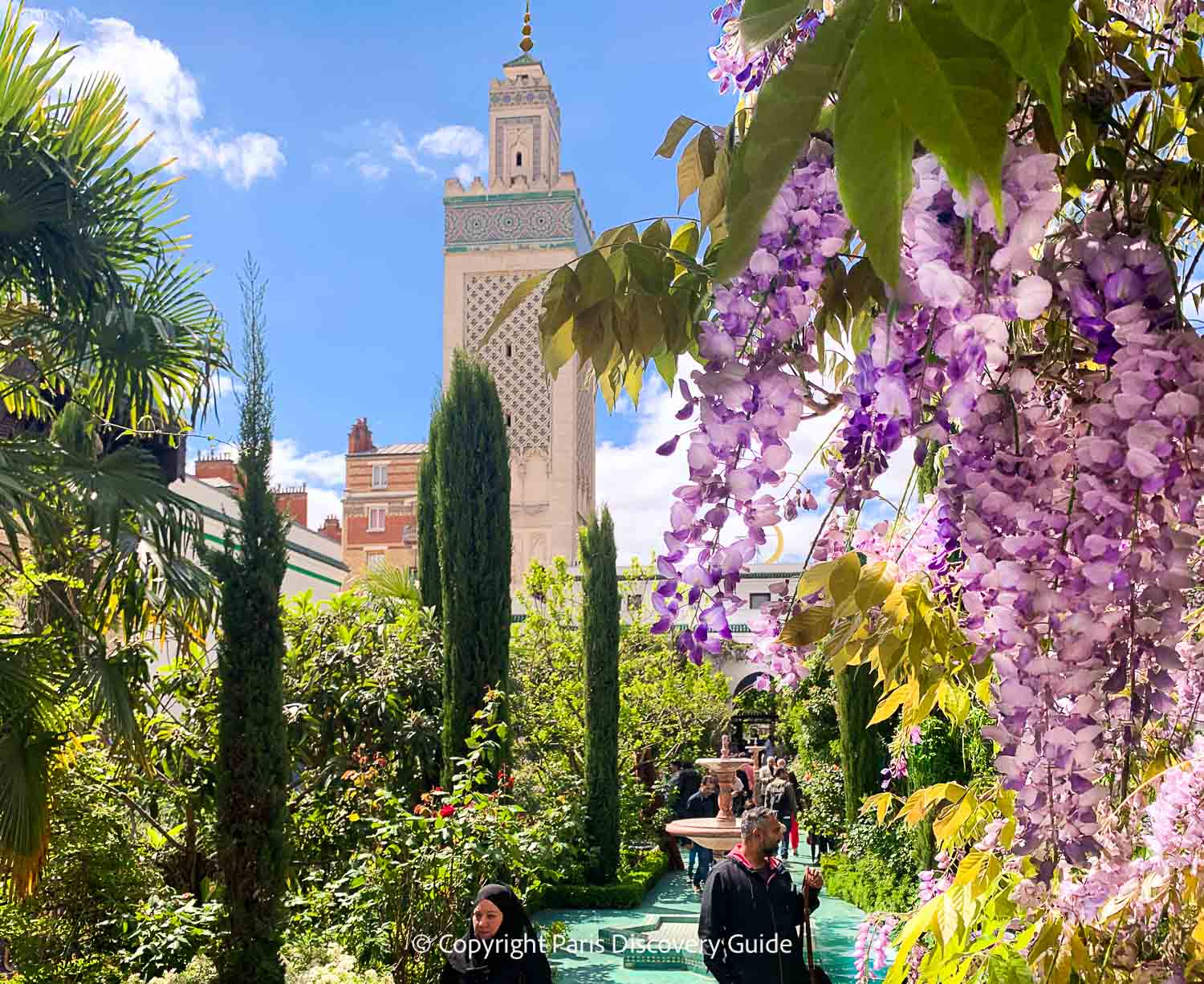
The design of the Grande Mosquée - the oldest in Paris - follows Moorish revival style and drew inspiration from an older Morrocan mosque. Its soaring 108-foot (33 m) minaret provides an impressive neighborhood landmark.
The mosque's walls surround a central courtyard where you can visit one of the city's most beautiful enclosed gardens: an Islamic-style oasis with a central fountain, shade trees, fragrant flowers, zellige tile mosaics and arabesques, and shallow pools divided by walkways.
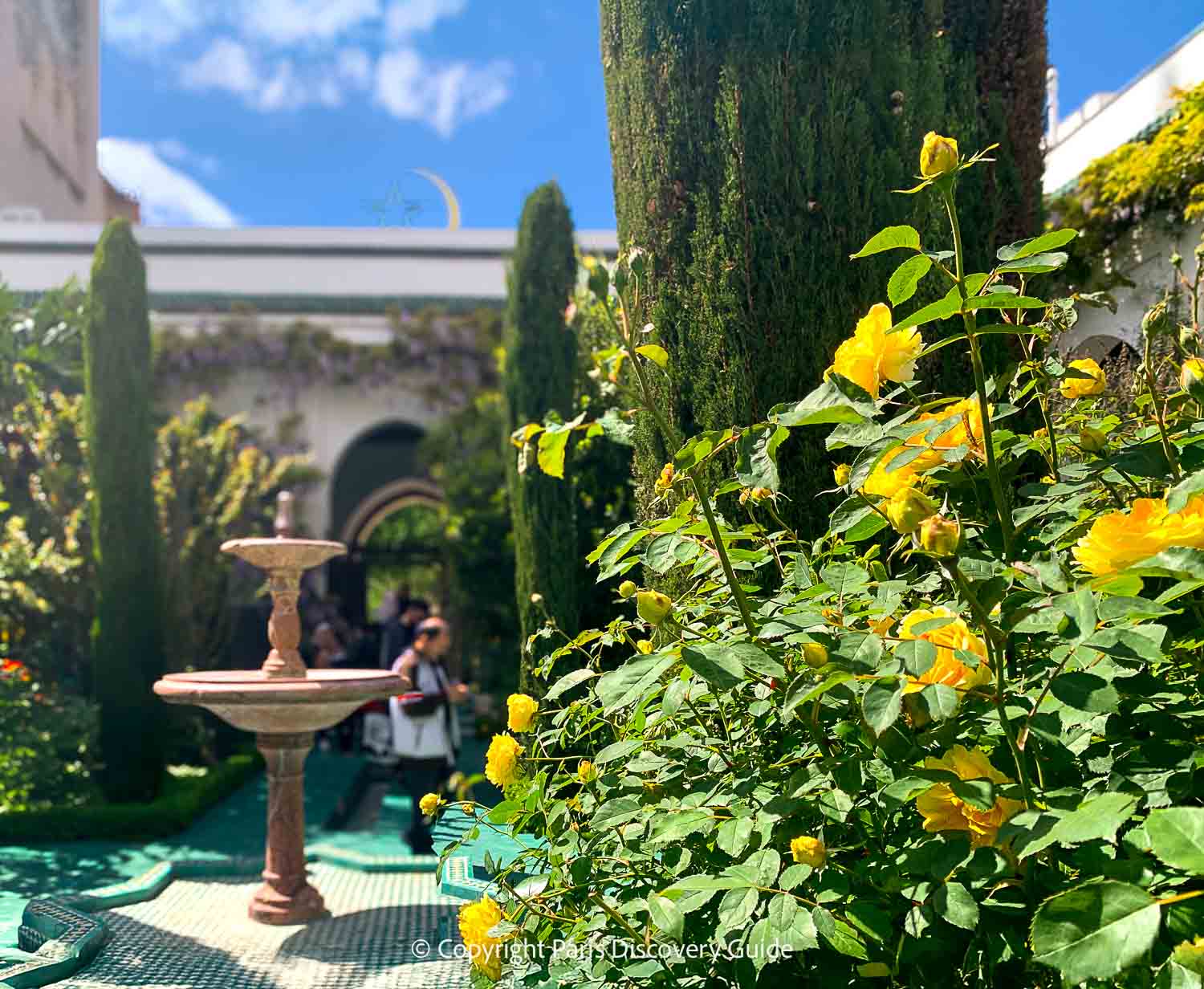
I took the photos of the garden that you see here on an early April day, just as lavender swaths of sweetly-scented wisteria and vibrant roses reached full bloom. The Parisian sky cooperated by being bright blue, adding to the magic of the experience.
What made the experience even more special was I was there on a Friday when the garden is normally closed to visitors. By chance, I'd chatted with two young women a couple of hours earlier as we shared a bench while eating sandwiches. Then as I was walking up Rue Linné past the mosque on my way to Jardin des Plantes, I saw them again as they waited in a short line by a door near the main entrance.
After we exchanged "bonjours," they invited me to go inside with them because it was a special occasion when mosque families and their friends could admire the garden's spring beauty for an hour before Friday prayers began.
Thanks to their kind hospitality, I experienced the garden's spring blossoms at their peak which you can see in the photos above, adding another treasured memory to my long list of special Paris moments.
Although access to the Mosquée's garden, located in a private area next to a prayer room and a library, requires a small admission fee (a guided tour in Arabic is also offered), you can freely visit its public spaces which include a charming open-air tearoom (my favorite place to sip mint tea and enjoy North African pastries in Paris), a North African restaurant (Aux Portes de l'Orient) where you can enjoy couscous and tangine, a small shop, and a hamman.
Grande Mosquée de Paris Location and Visitor Information
Entrance for visits: Corner of Rue Daubenton and Rue Geoffroy-Saint-Hillaire; Metro: Place Monge or Jussieu
Open: Every day except Friday and Muslim holidays, 9am - 6pm
More information: Grande Mosquee de Paris website
Admission (to non-public spaces such as the garden): 3€ (tours in Arabic are also available)
More to visit nearby: Arenes de Lutece (an old and hidden Roman Arena), Jardin des Plantes
Stroll through a Modern Rosarie in Jardin des Plantes
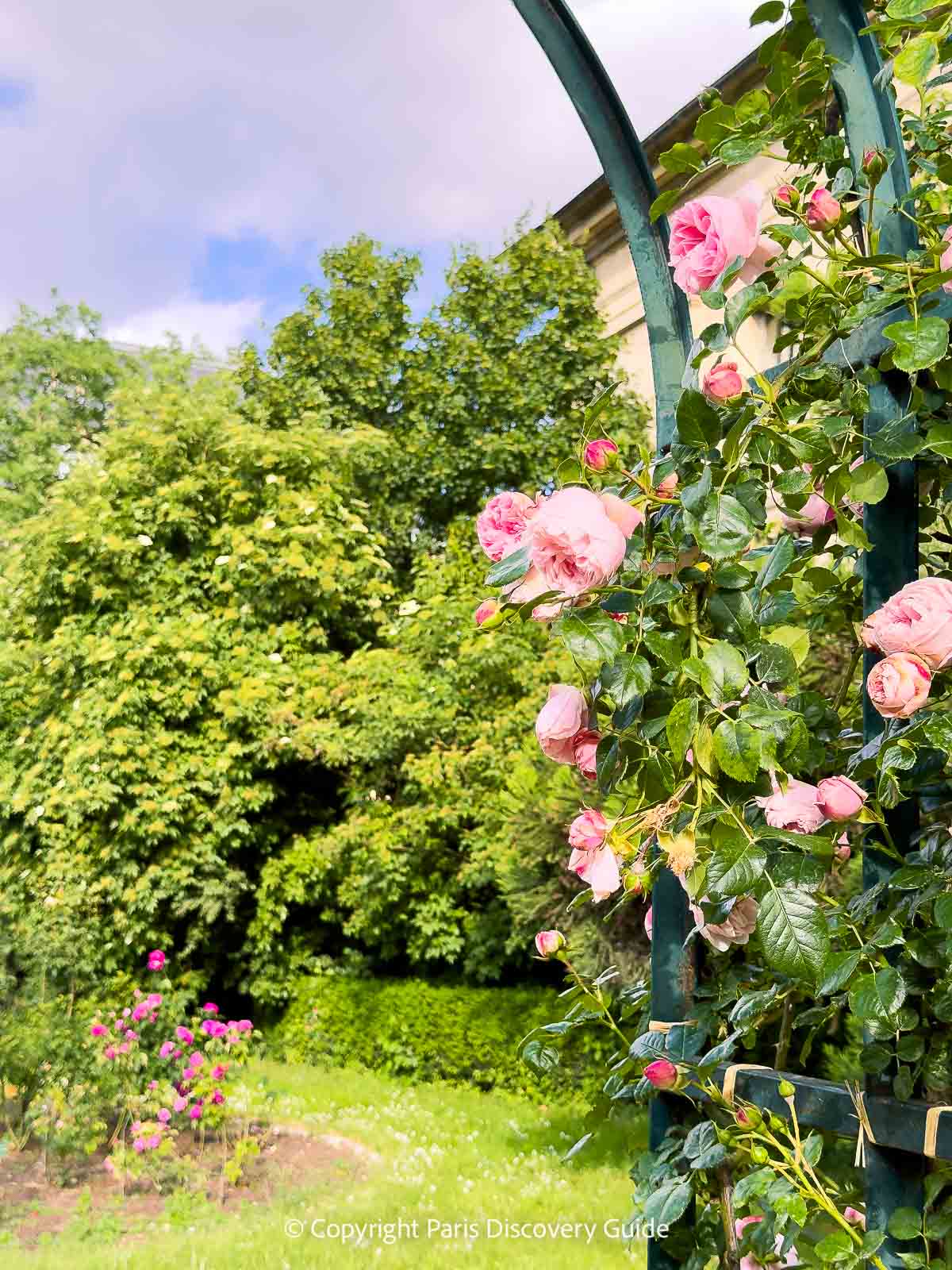
Although the Jardin des Plantes originated in the 17th century and is France's most oldest botanical garden, its lush Rosarie dates back only to 1990 and contains a mosaic of recent rose varieties.
Although you can enter the enormous Jardin des Plantes through any of its 12 gates, you may want to choose the closest entrance to the rose garden for convenience.
You'll find the entrance near the corner of Rue Daubenton and Rue Geoffroy-Saint-Hillaire, almost directly across the street from the Grande Mosquée, as shown on this map:
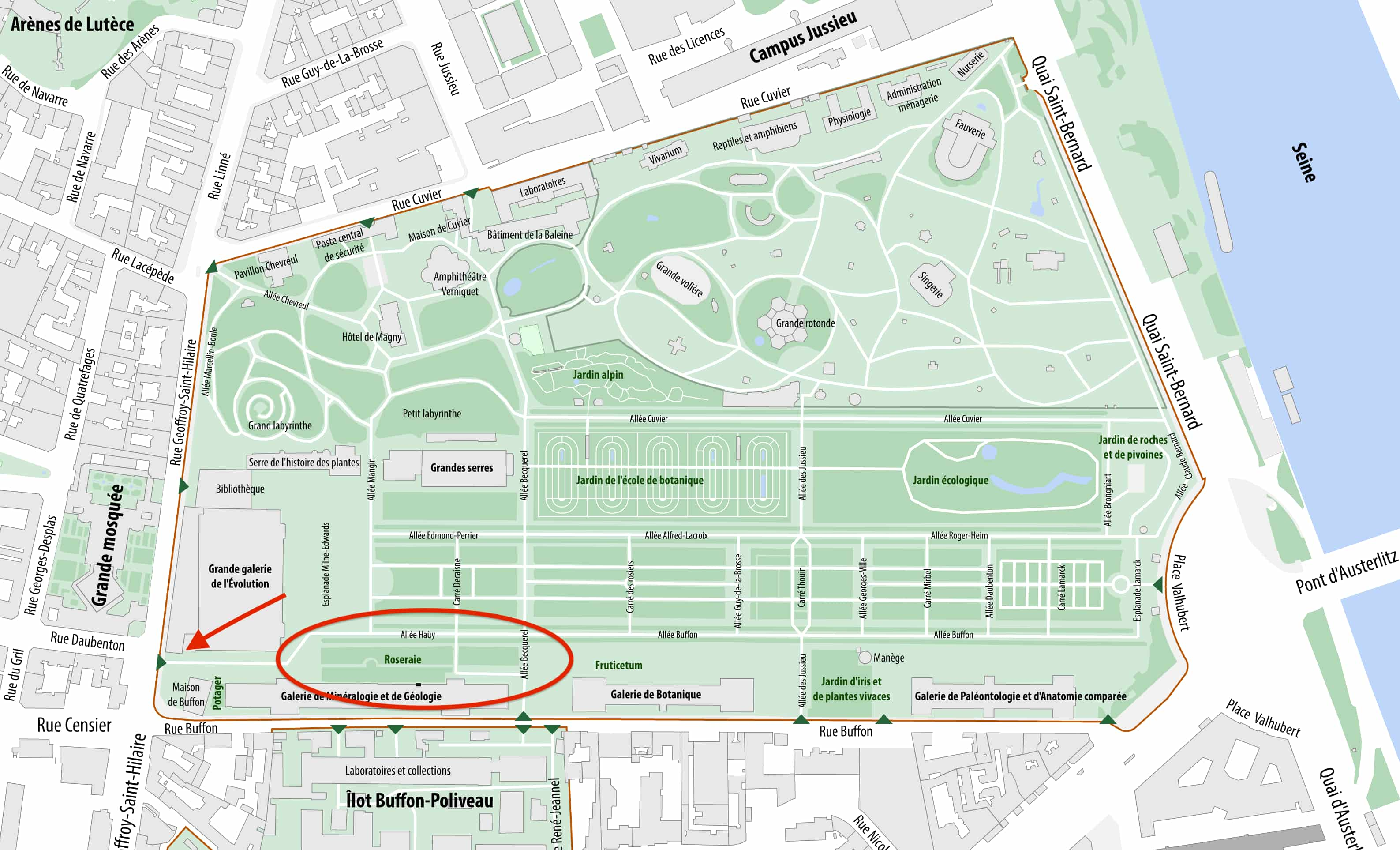
Once you're in the rose garden, you'll see a series of high arches covered by climbing roses in various hues dramatically frame an elevated path surrounded by beds filled with even more roses.
During May and June when the roses reach their peak blooming season and lightly scent the air with their intoxicating fragrance, you easily forget that garden's main purpose is educational.
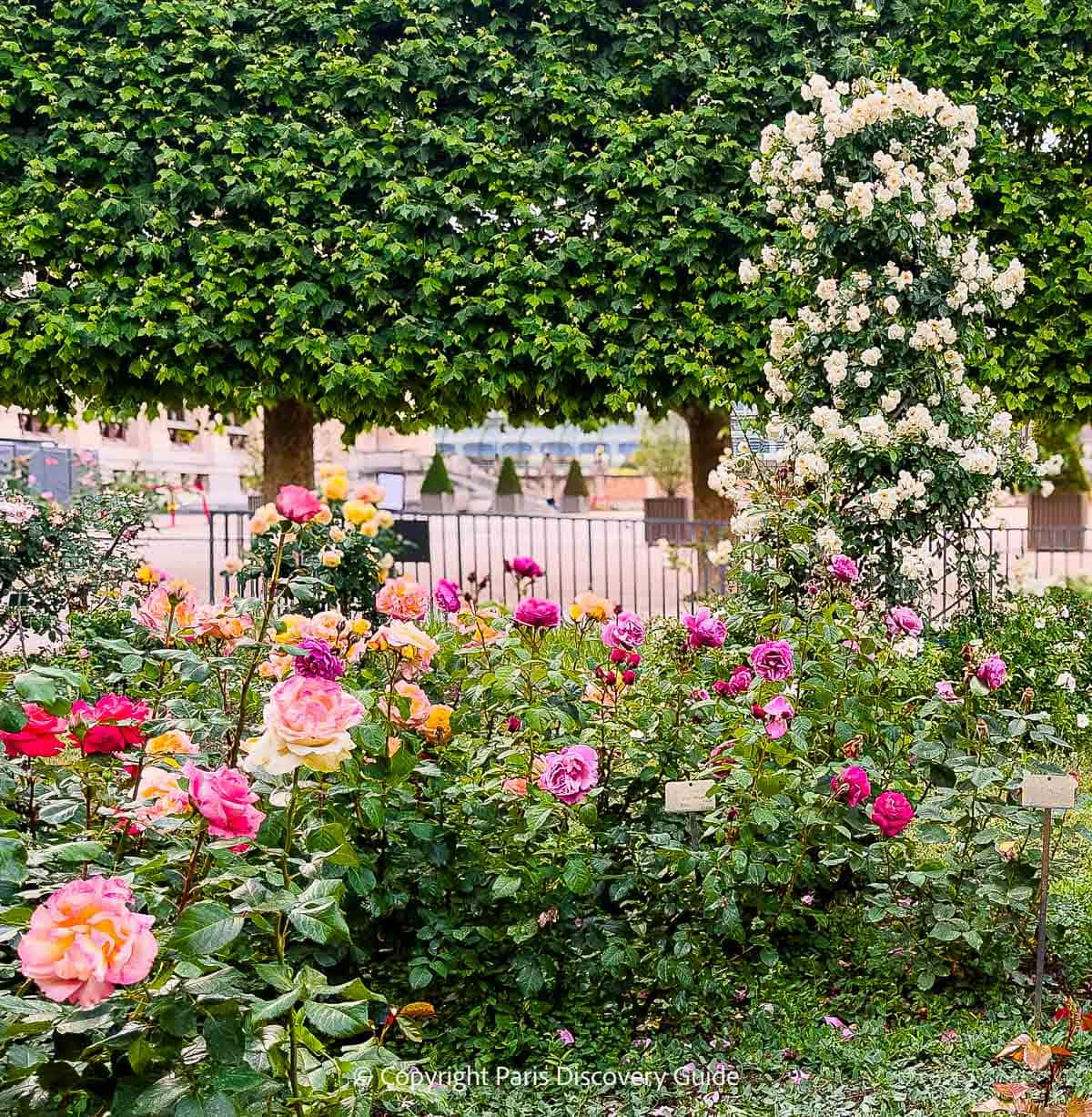
Like the rest of Jardin des Plantes, the Rosarie is part of a botanical school where botanists from throughout France come for training.
The entire jardin is actually part of the Sorbonne University and contains several museums (including the family-favorite Museum of Natural History), large greenhouses, a small menagerie, an elaborate labyrinth (maze), and 11 distinct garden areas.
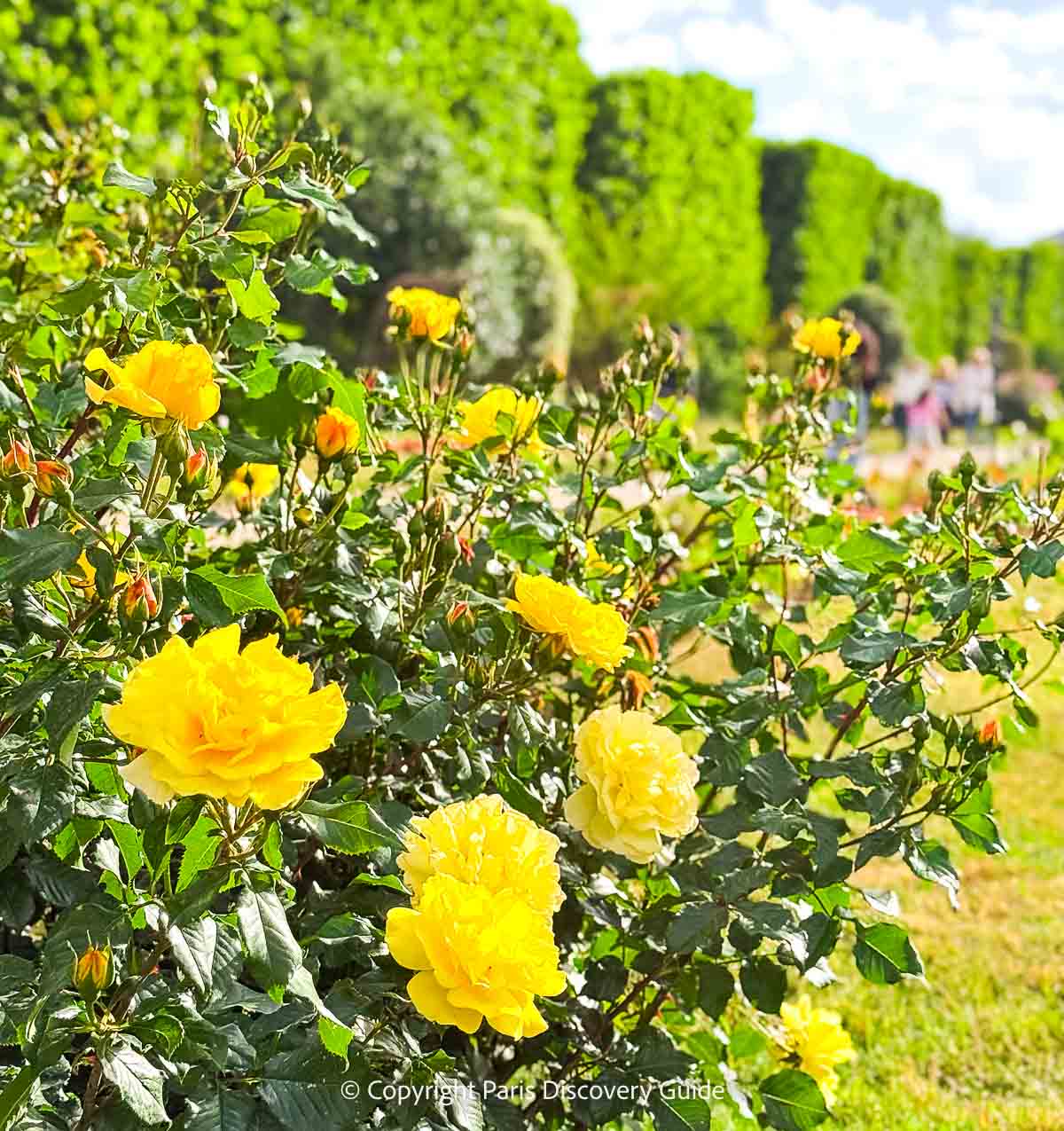
In keeping with Jardin des Plantes' academic mission, it contains hundreds of species of roses and even rose trees.
Stroll along the paths and notice the kaleidoscope of colors created by the rose blossoms, seemingly artfully arranged.
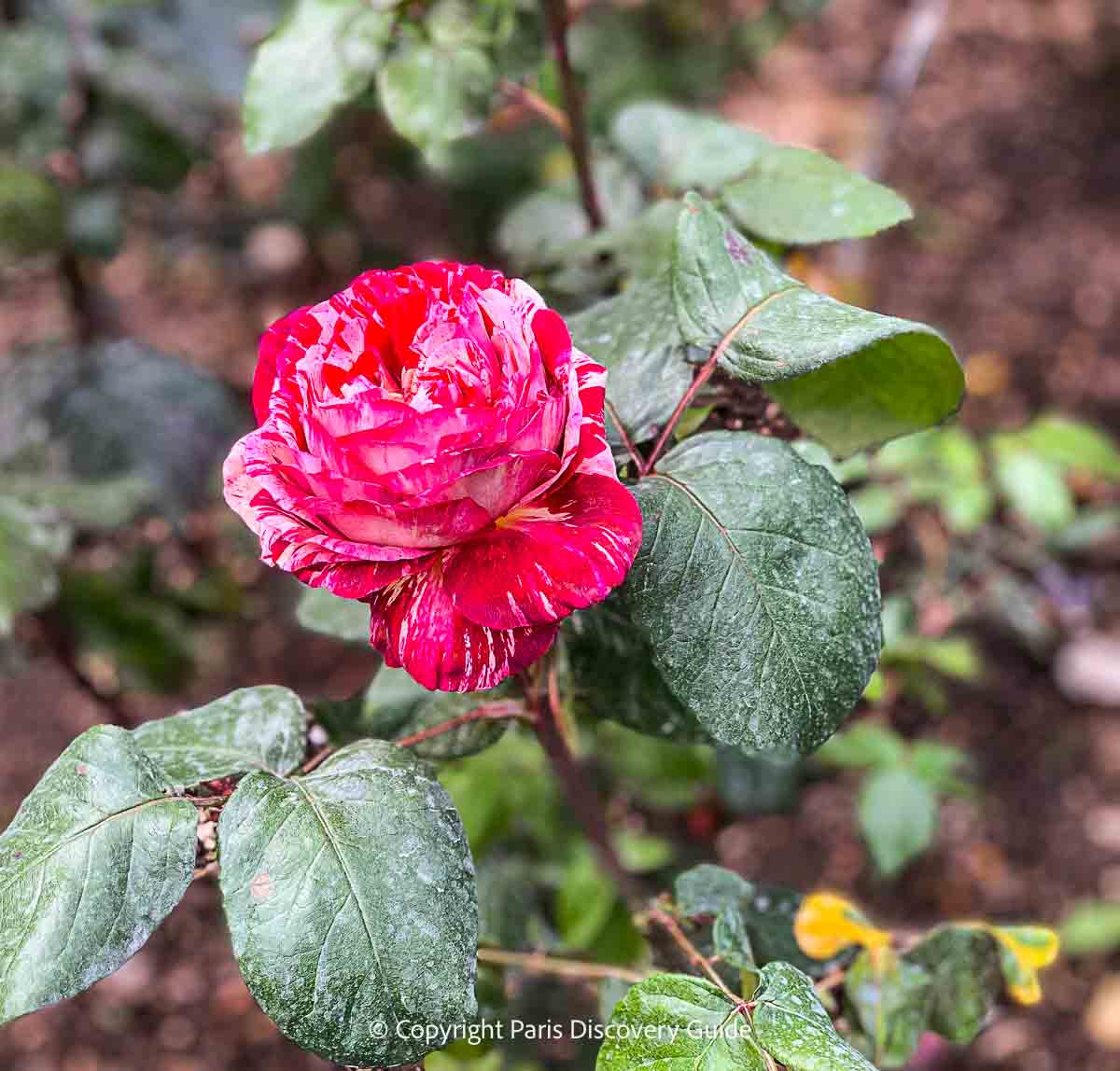
As a casual visitor, you would never guess that the reason for the diversity of hues and forms in Jardin des Plantes' rose garden is for teaching purposes, rather than solely for your viewing pleasure.
But look closely, and you'll see botanical labels inscribed with both the market name and the botanical name tucked in the soil next to each rose bush - which comes in quite handy if you spot a variety that you love and wonder if you can find when you return home.
Tip: Take a photo of the rose's label with its botanical name and variety to make finding it in your local area easier.
Are the Roses in Jardin des Plantes Available Outside of France?
Many, if not most, of the roses in Jardin des Plantes are newer varieties, so your chance of finding at least some of them in nurseries in your home country, especially if you live in the U.S., Canada, or the U.K., are fairly high.
And of course if you live in France, try your local nurseries.
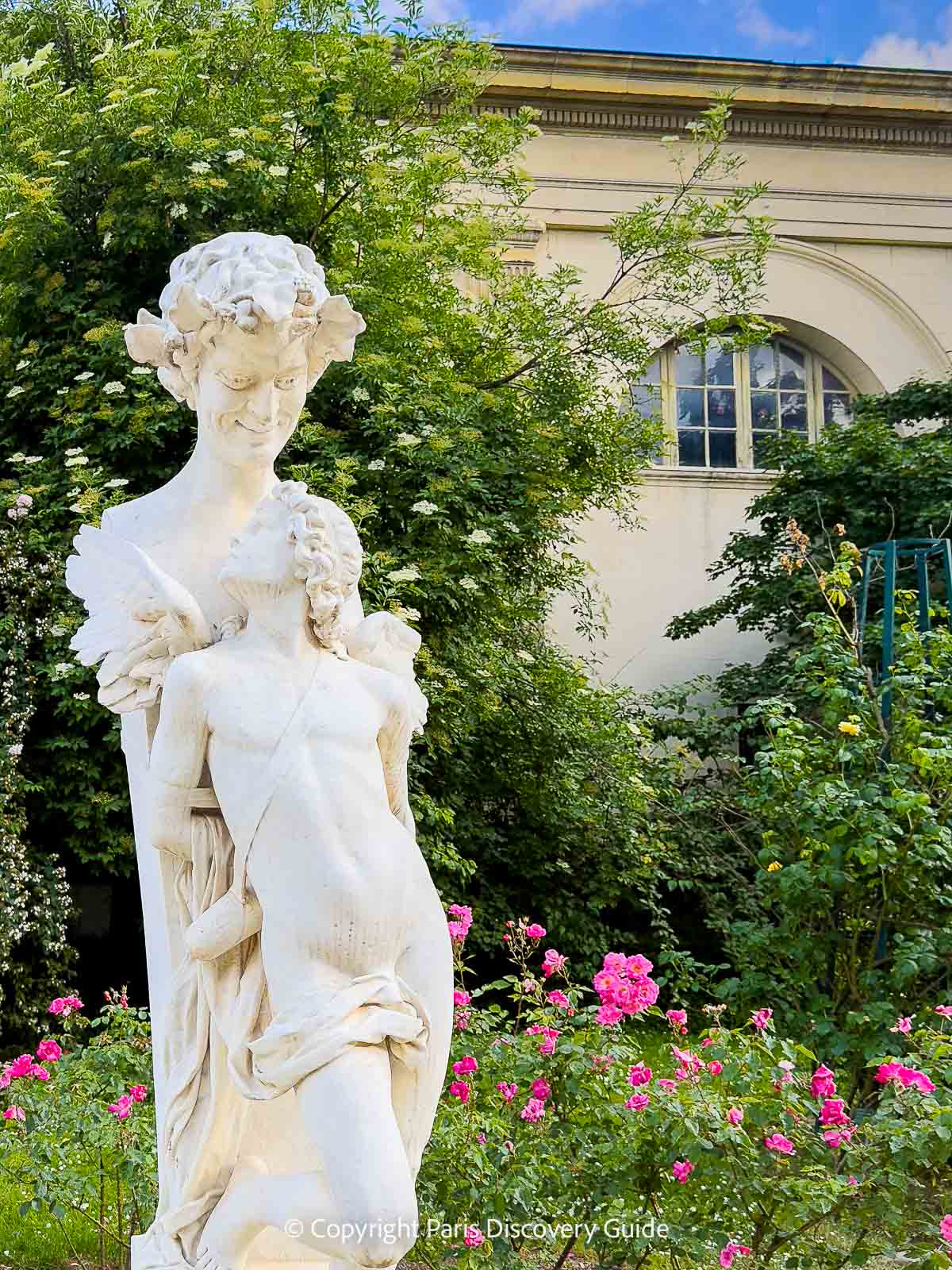
Jardin des Plantes Location and Visitor Information
Address of Main Entrance: 57 rue Cuvier; Metro: Jussieu or Gare d'Austerlitz
Open: Every day, 7:30am - 8pm
More information: Jardin des Plantes website
Admission: Free for the garden areas (entrance fee required at museums, greenhouses, menagerie, and special events)
More to visit nearby: In addition to the previously mentioned Arenes de Lutece and the Great Mosque, the modern sculptures along Quai Saint-Bernard next to the Seine River are fun to see as you stroll past; even better, in late afternoon/early evening, you'll often hear music and see people dancing on the small plazas along the Quai - feel free to join them!
Admire the Rose Garden Surrounding a Family-Friendly Playground in Jardin du Luxembourg
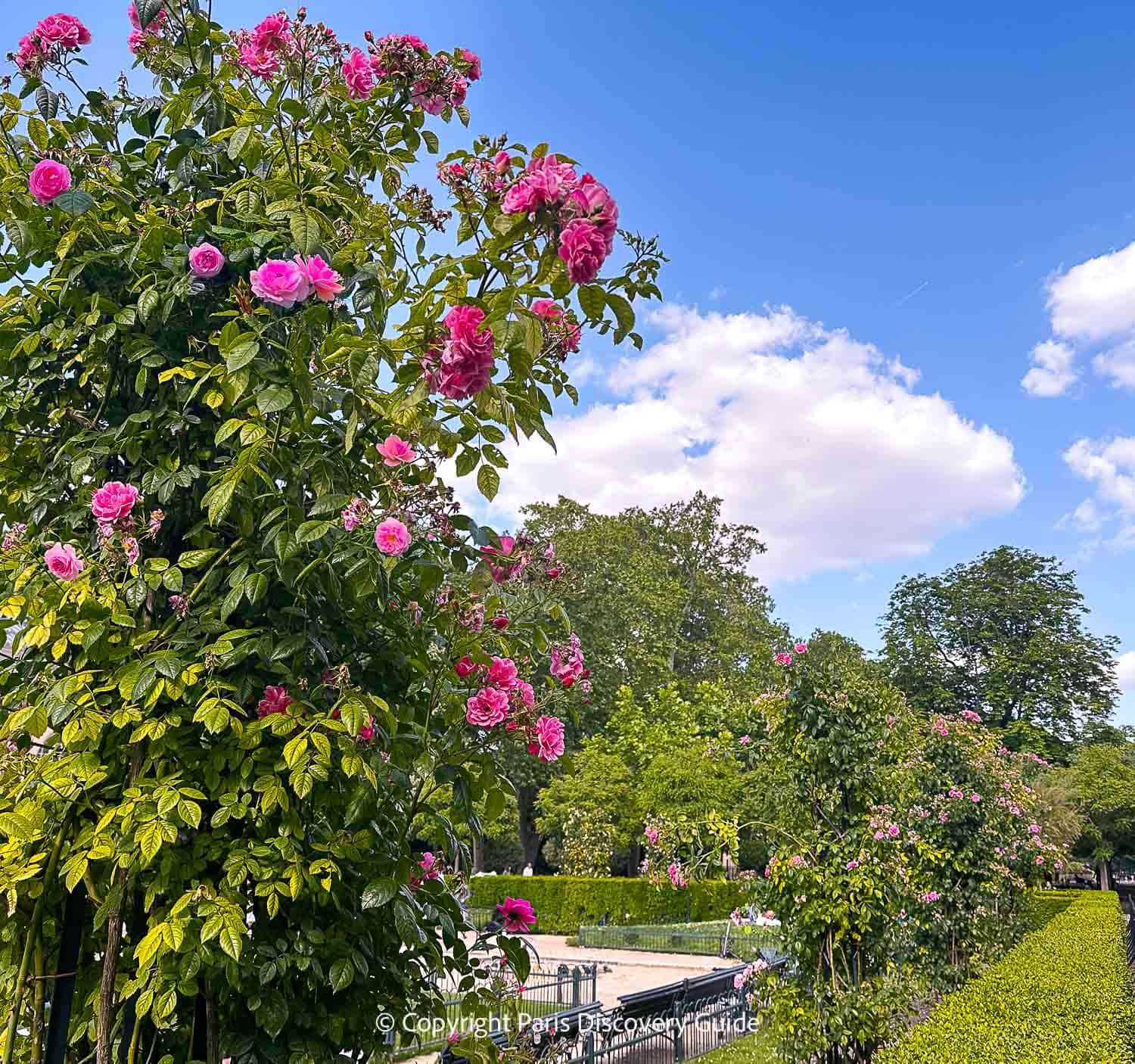
The next stop on our online stroll of Paris rose gardens is Jardin du Luxembourg, situated between the Latin Quarter in the 5th arrondissement and the Saint-Germain-des-Prés neighborhood in the 6th, and by far the most popular park on the Left Bank.
The 57-acre park dates back to 1612 when Marie de' Medici, crowned Queen of France on the day before her husband Henry IV died at the hands of an assassin, ordered the creation of the garden next to her newly built Luxembourg Palace, now owned and occupied by the French Senate.
By the 1800s, Luxembourg Garden's rose garden gained recognition throughout France for its hundreds of rose varieties. Although the rose garden fell into ruin before World War I, it was eventually restored and today contains about eight of the original climbing rose varieties.
Tall metal trellises support the pink and white roses as they reach to the sky. Along with a low evergreen hedge, planting beds for perennials, and the curvy green slat benches you see in so many Paris parks, they frame a sand-filled playground for young toddlers.
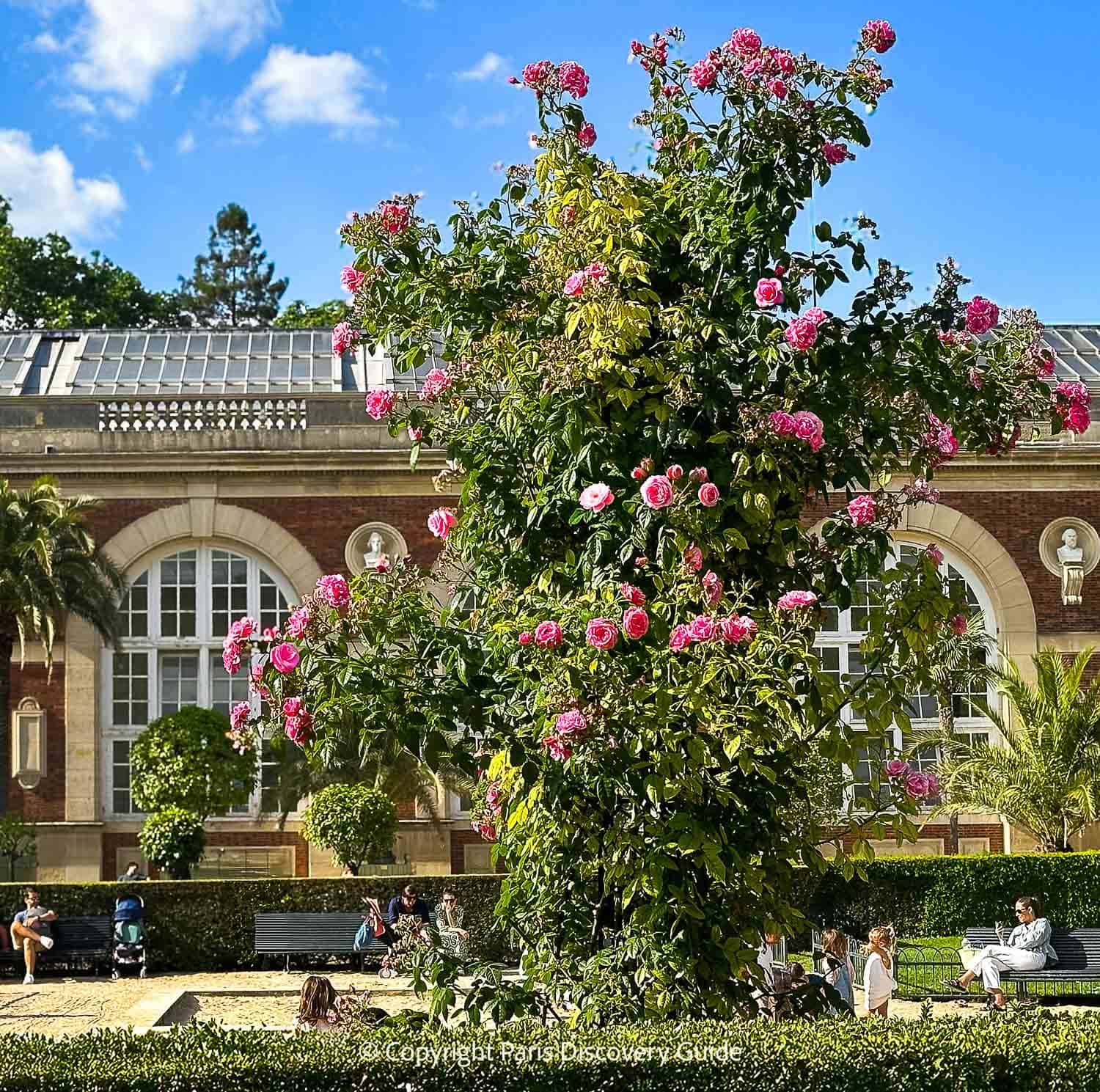
The spectacular roses in Luxembourg Garden are definitely worth a visit.
But you should also not miss the many, many other attractions here: the beautiful water feature flowing from an ornate grotto known as the Medici Fountain, the garden's numerous statues including a version of the Statue of Liberty, a large pool where children use long sticks to "sail" wooden boats, an informal restaurant, urns overflowing with flowers, green lawns, meticulously tended flower gardens and flowering shrubs, puppet shows for children, tennis and basketball courts, a small apple orchard, and so much more.
Jardin du Luxembourg Location & Visitor Information
Location : Located between Rue de Médicis and Rue de Vaugirard, 6th arr; also useful to know, entrances are on Rue de Vaugirard; Rue de Guynemer, Rue d'Assas, Rue Auguste Comte, Boulevard Saint-Michel, and Rue de Médicis; RER: Luxembourg; Metro: Notre-Dame-des-Champs
Open: Every day including public holidays, 7:30am-8:15 am to 4:30pm-9:30pm, depending on the season
More information: Jardin des Plantes website
Admission: Free for the garden areas (entrance fee required at museums, greenhouses, menagerie, and special events)
More to visit nearby: The Pantheon, Musée Zadkine (one of my favorite small Paris museums; free admission), Saint Sulpice Church, Musée de Cluny (Medieval & Roman art and artifacts)
Where to Stay near Jardin du Luxembourg
- Bonsoir Madame
- Hotel de l'Abbaye Saint-Germain
- Hotel Saint Paul Rive Gauche
- Hotel les Jardins du Luxembourg
- Hotel Luxembourg Parc
Roses at Musée Rodin: Paris's Most Beautiful Sculpture Garden
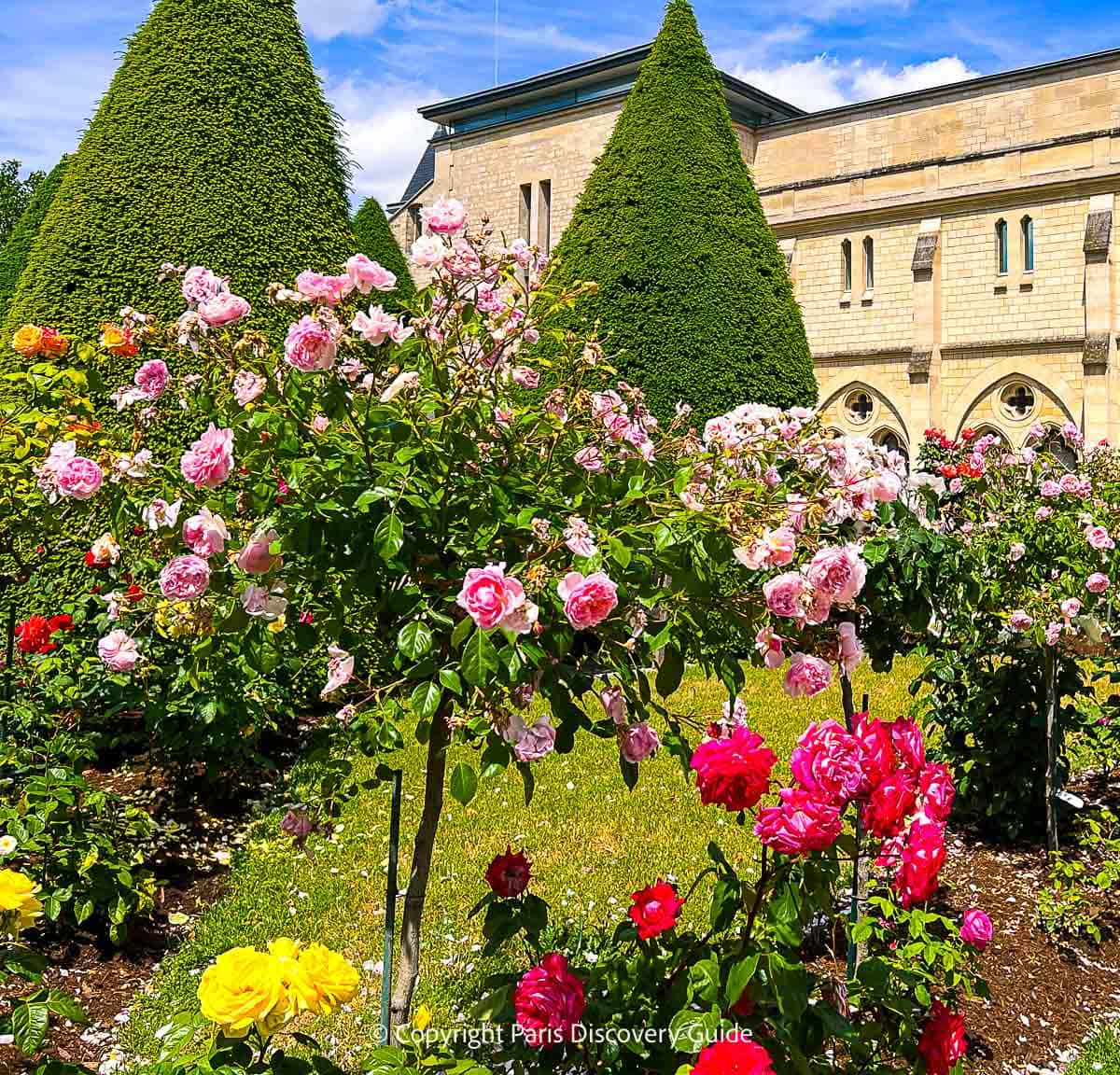
"Flamboyant" barely begins to describe the display made by the formal rose gardens flanking the entrance to Hotel Biron, the early 18th century rococo private mansion once used by French sculptor August Rodin as his workshop and now the site of Musée Rodin.
You can see most of Rodin's most famous sculptures such as The Thinker, The Kiss, The Three Shades, and The Gates of Hell here, both inside the museum and outside in the spacious manicured gardens.
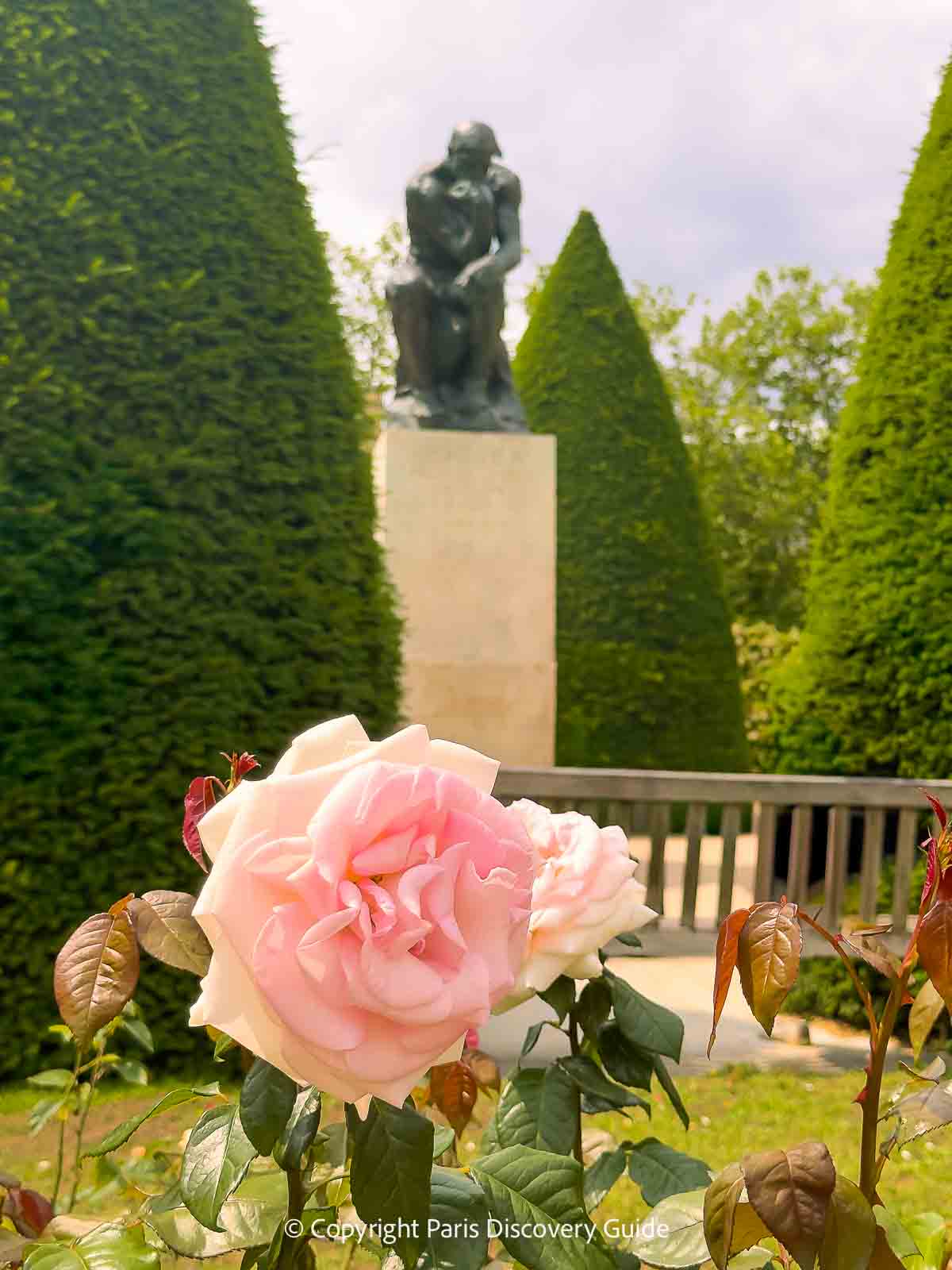
However, in May and June, the vivid-hued roses in the garden attract the most attention, especially on a sunny afternoon when you can take a leisurely stroll through the garden and spot a spectacular rose juxtaposed against a well-known structure in a way that makes you see both from a new perspective.
Tip: Once you see Rodin's most famous works in this beautiful outdoor setting, you may lose interest in ever seeing them inside the walls of a museum - so if you do want to visit the Rodin Museum (which, aside from the art, is well worth seeing due to its spectacular architecture) while you're here, walk through it before you head out to the garden.
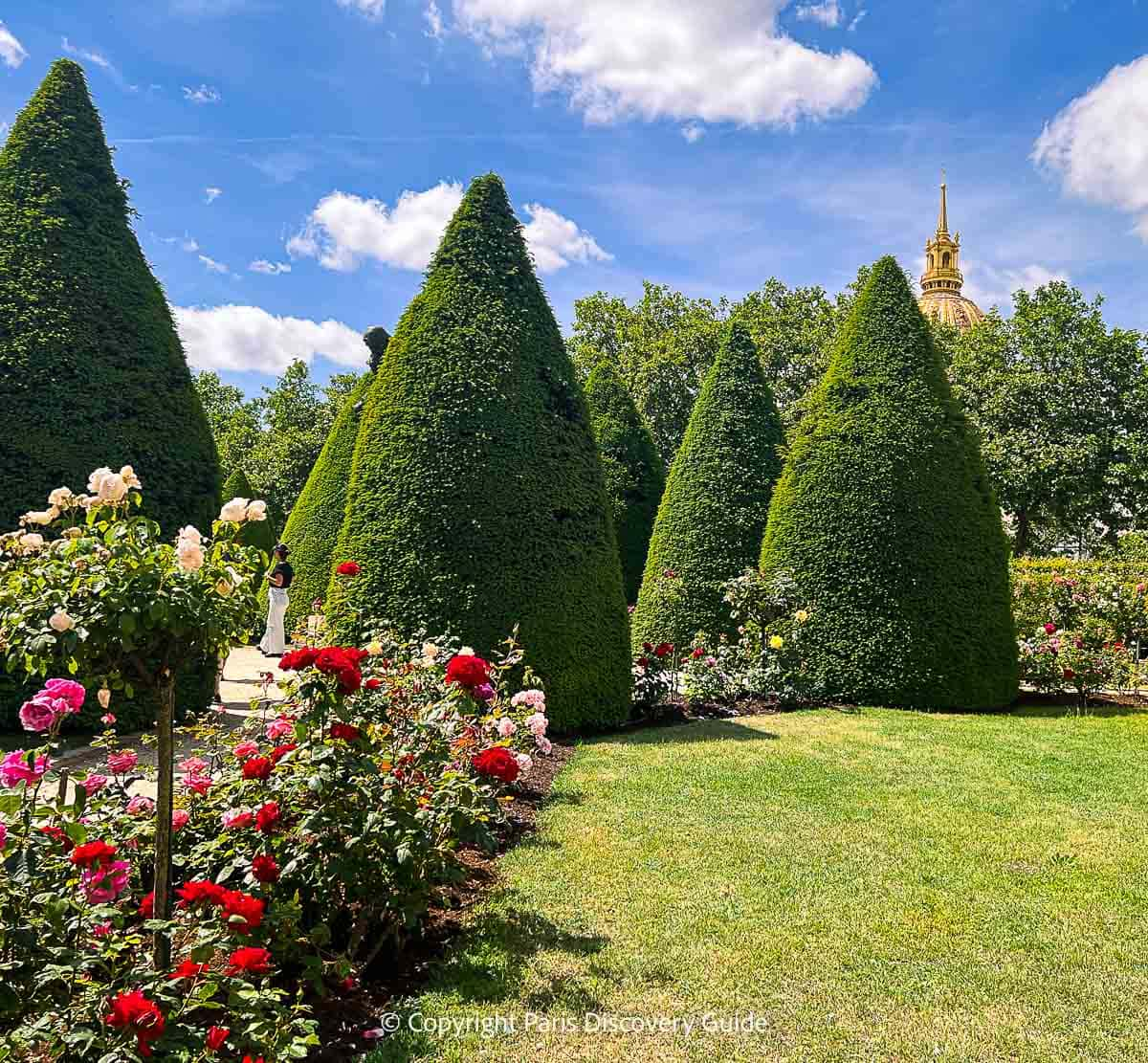
In the garden's background, you can spot the tops of two of Paris's most recognizable attractions: the golden Invalides Dome (which contains Napoleon's tomb), the embodiment of late 17th century French Baroque design, and Gustave Eiffel's modernistic engineering wonder of the late 1880s, the Eiffel Tower.
In fact, if you're visiting the Eiffel Tower or Invalides, consider walking over to the Rodin Garden after your visit and treating yourself to a rose-colored stroll.
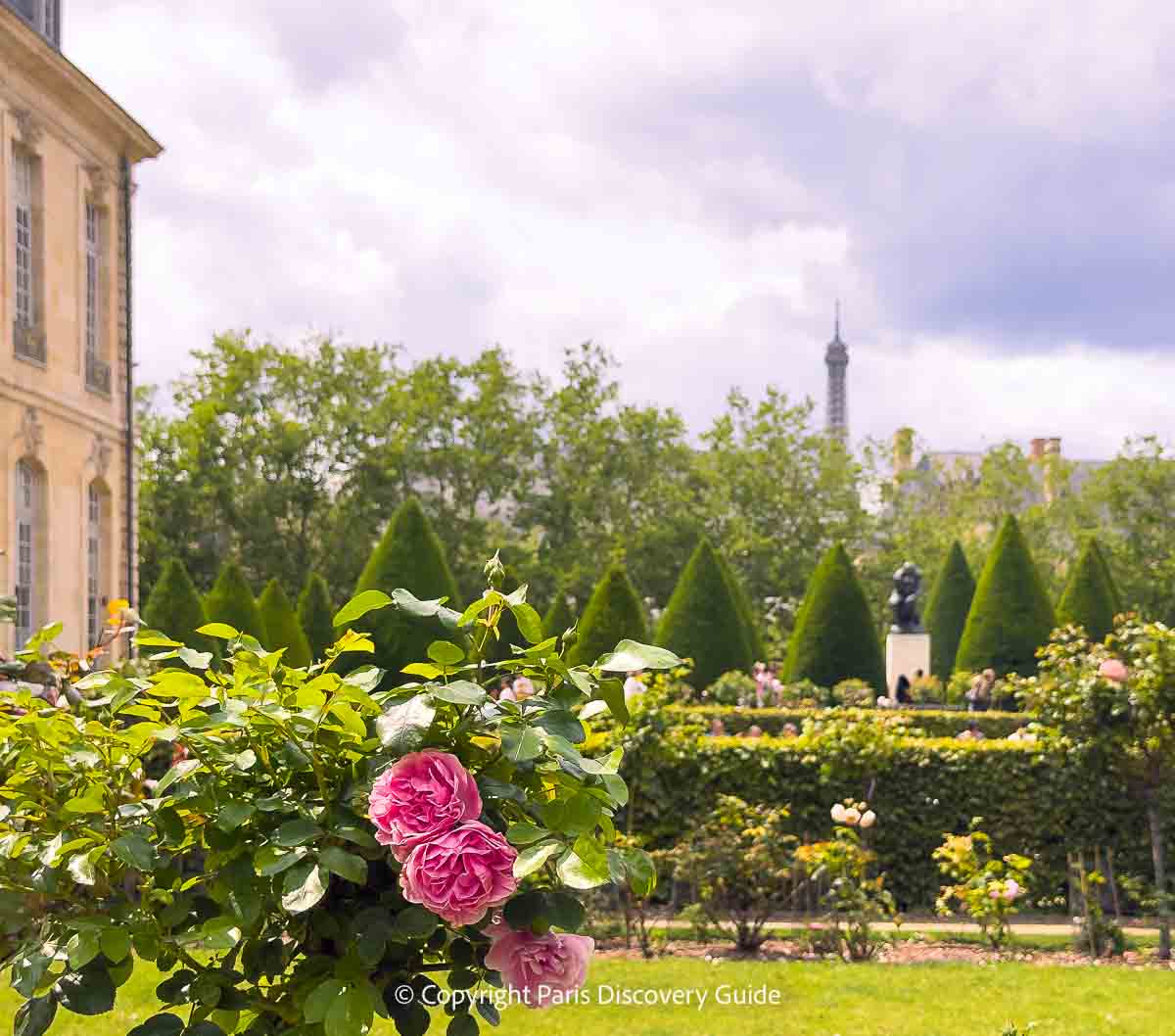
During his lifetime, art critics complained that Rodin didn't adhere to the more formulate figurative styles of of the mid-to-late 1800s but today, Rodin is considered a pioneer of modern sculpture due to the naturalism of the human bodies he sculpted.
Similarly, the garden's tapestry of multi-colored roses and billowing hydrangeas provide a naturalist contrast to the symmetry of the garden's design and backdrop of formal conical evergreens.
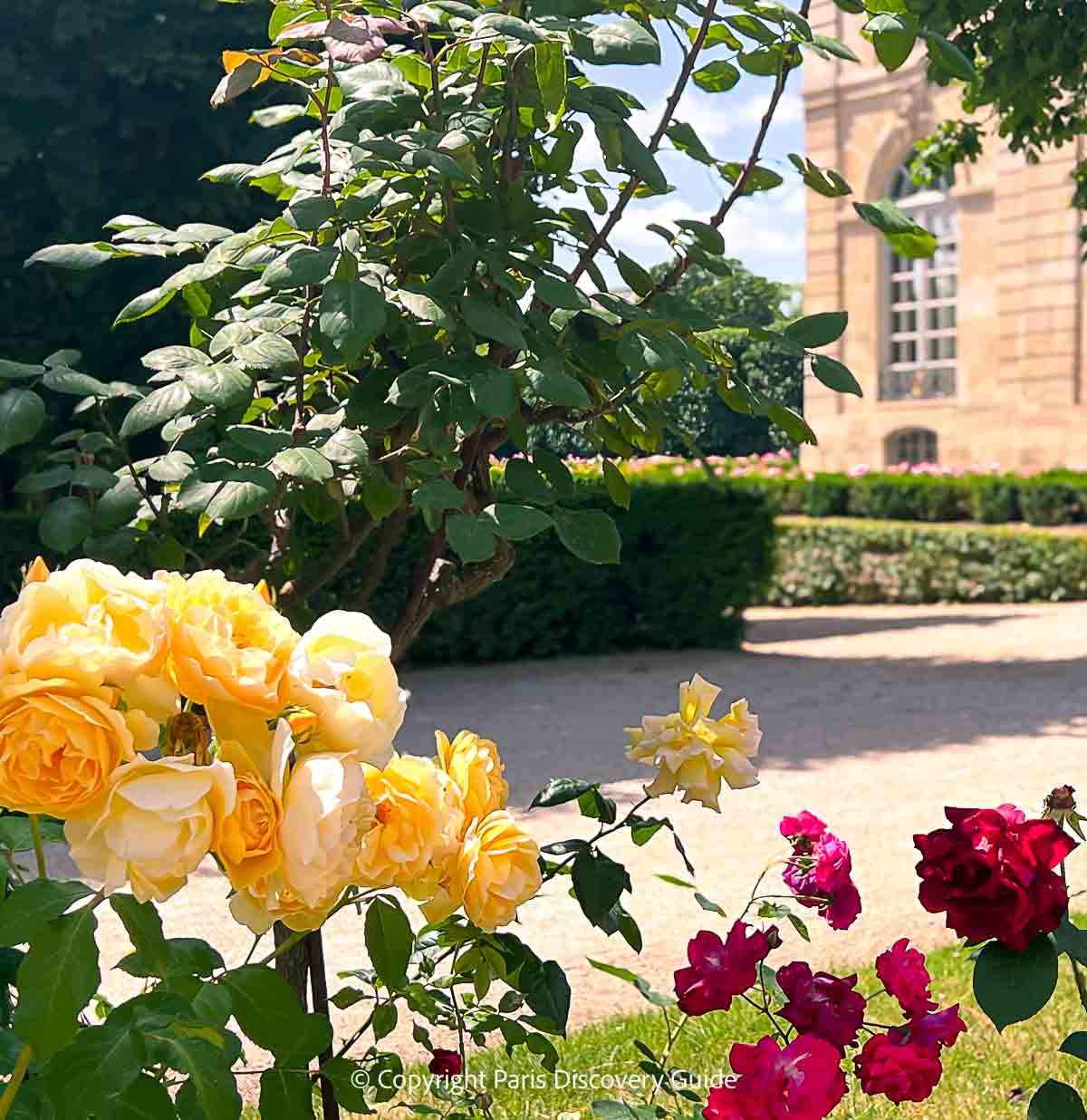
Rodin Museum Garden: Location & Visitor Information
Location: Located behind the Rodin Museum: 77 Rue de Varenne, 7th arrondissement; Metro: Varenne; RER C: Invalides
Open: Tuesday - Sunday, 10am-6:30pm; closed on January 1, May 1, and December 25; closes at 5pm on December 31
Admission: Included with museum entrance ticket (a decade or so ago, you could enter the garden for free - but not any more)
More to visit nearby: Eiffel Tower, Musée de l'Armée & Napoleon's Tomb, Musée Zadkine (one of my favorite small Paris museums; free admission), Saint Sulpice Church, Musée de Cluny (Medieval & Roman art and artifacts)
Where to Stay near Musée Rodin
- Hotel du Palais Bourbon - Small boutique hotel with 26 rooms & suites, many of which are surprisingly spacious for Paris
- Hotel Varenne - I stayed here a few years ago - excellent experience, plus I loved the garden patio where I had breakfast every morning
- Hotel Bourgogne - Wonderful location between Musée Rodin and the Seine River
Roses along Pedestrian Lanes
Want to see more beautiful roses while exploring lesser-known parts of Paris well off the beaten track?
None of these locations (except Villa Leandre in Montmartre) is close to top attractions - but if you enjoy experiencing authentic Parisian neighborhoods, they're wonderful destinations to see along the way.
Here are photos and addresses for some of my favorite pedestrian-only passages North and East Paris.
Roses along the Cite des Fleurs Pedestrian Lane in Epinettes, 17th Arrondissement
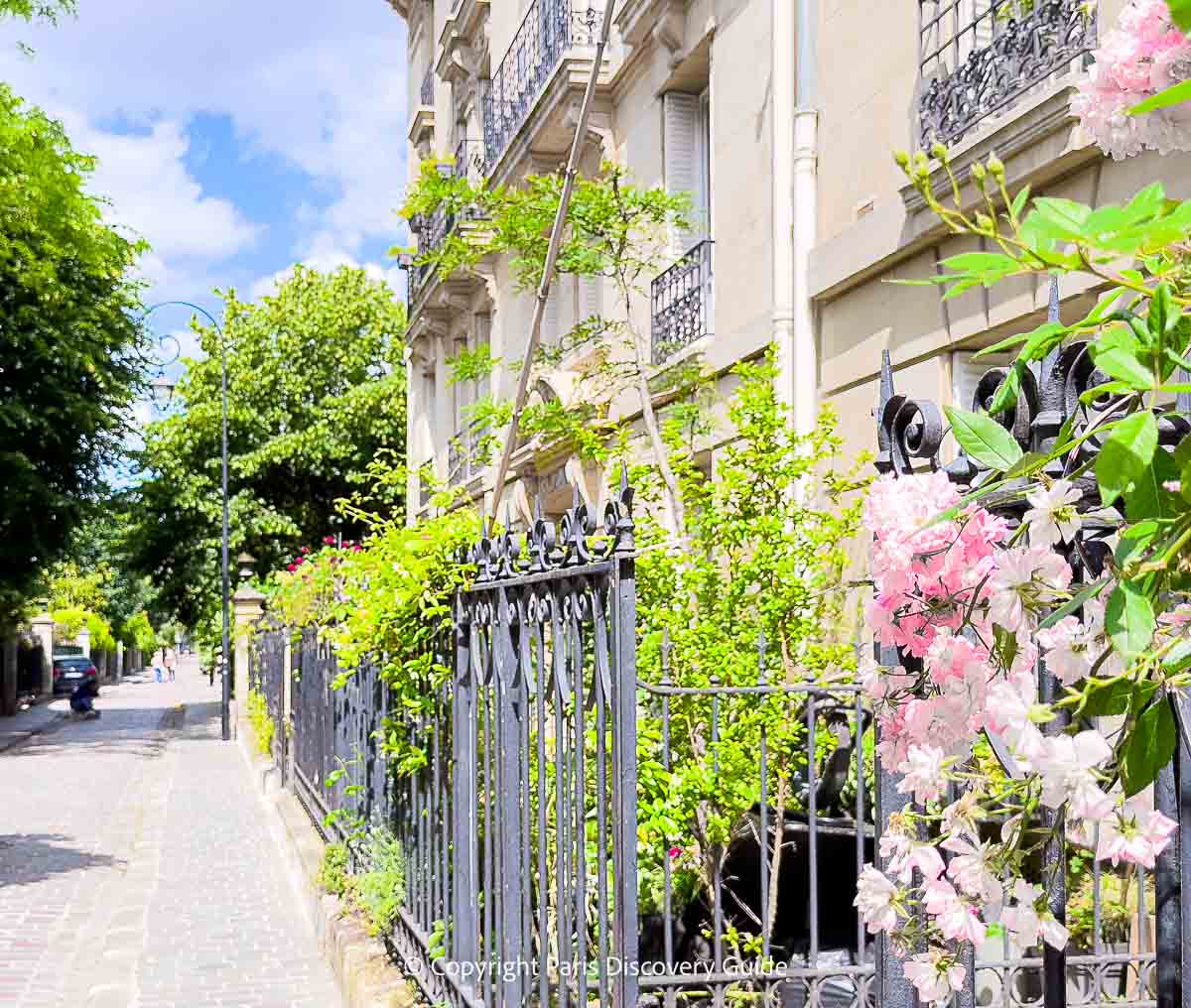
Epinettes, a small neighborhood near the northeast corner of the 17th arrondissement, was once part of the village of Batignolles-Monceau before becoming part of Paris when Napoleon III annexed them along with other villages in 1860.
About 14 years before the annexation, a developer created Cité des Fleurs, a group of charming houses built in a variety of styles along a gated lane bordered by their gardens (thus the name).
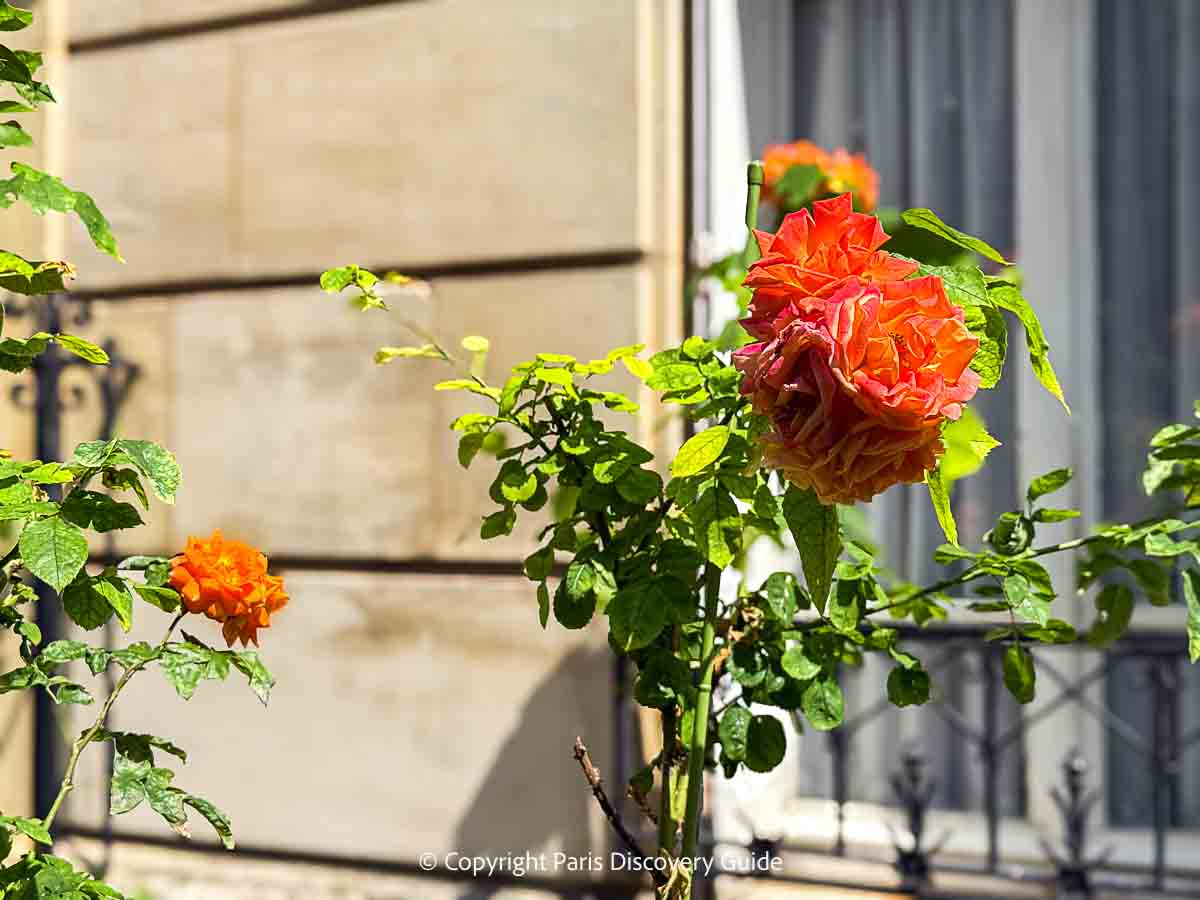
Thanks to restrictions put in place at the time of construction, this elegant enclave remains mostly unchanged with gorgeous flowers including roses overflowing the garden walls along the lane and resident cats darting under the fences.
Impressionist Alfred Sisley lived here in the 1860s, and depicted his view of the village of next-door Montmartre (which looked quite different than it does today) in his 1869 painting,Vue de Montmartre, depuis la Cité des Fleurs aux Batignolles,
Cite des Fleurs Location
- 17th arrondisssement, between Rue de la Jonquière and Rue Guy Moquet; Metro: Brochant
Roses along Villa Leandre, Montmartre, 18th Arrondissement
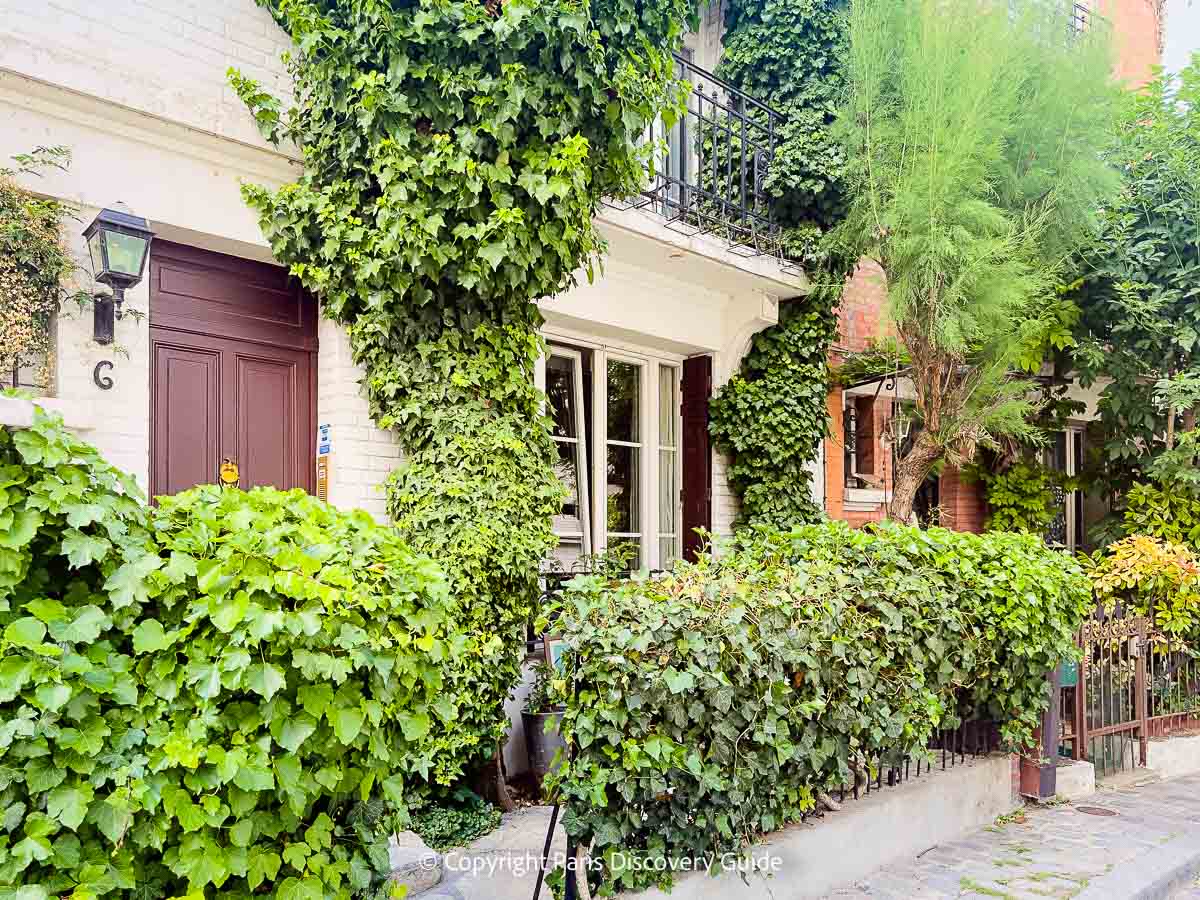
Away from the throngs of tourists crowding the parts of Montmartre around Sacre Coeur Basilica, Place du Tertue, and Rue des Abbesses, you can find Villa Leandre, quiet cobblestone dead-end lane (called an impasse in French), branching off from Avenue Junot near the intersection with Rue Girardon.
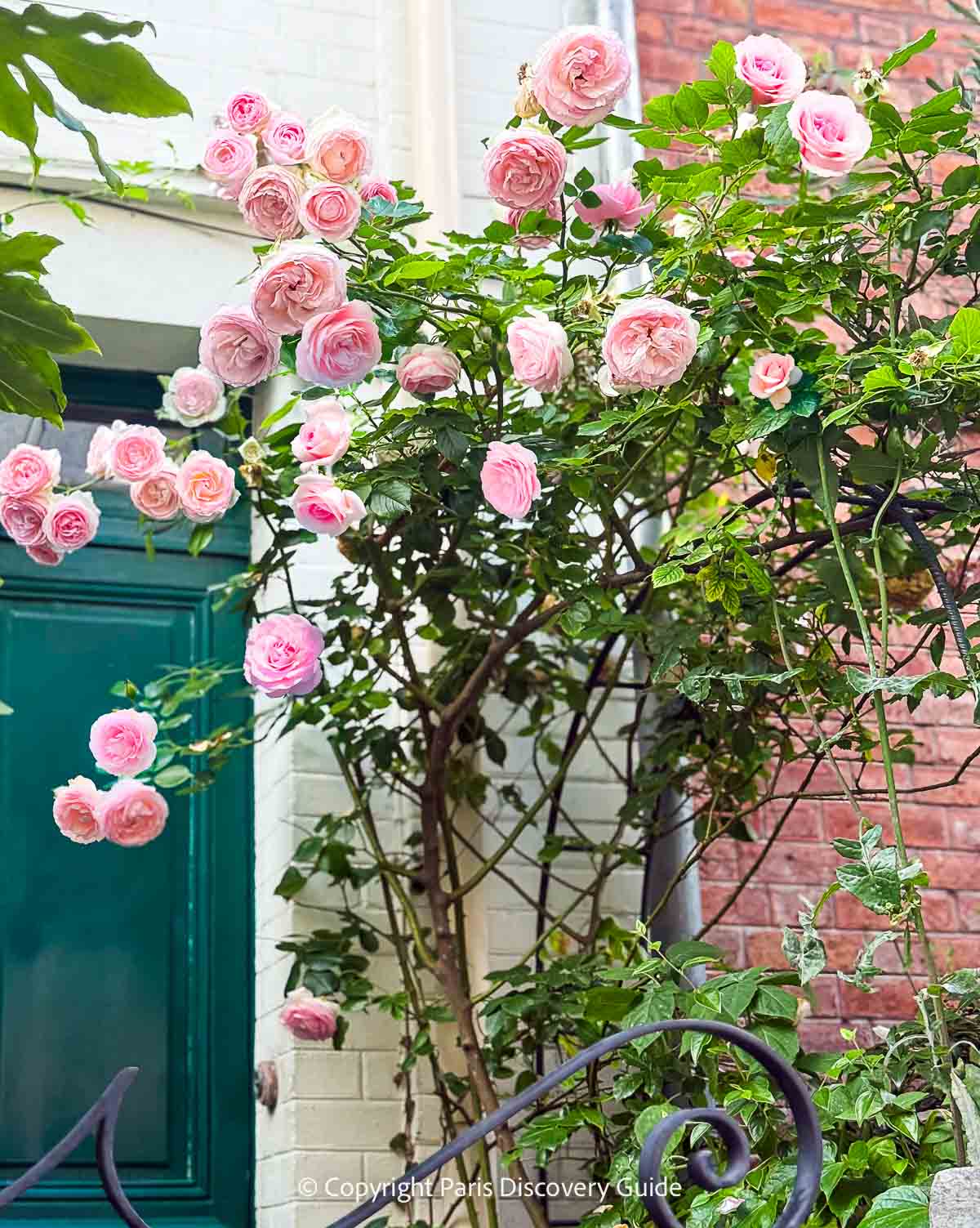
Although the lane was constructed back in 1926 when much of Montmartre was still an impoverished and dangerous slum, Villa Leandre features an eclectic mix of charming Normandy-style homes with an Art Deco vibe.
Adding to the lane's appeal are the tiny front gardens where you can spot roses pink, white, and rose blooms from spring through fall.
Villa Leandre Location
- 18th arrondisssement, between Rue de la Jonquière and Rue Guy Moquet; Metro: Lamarck-Cailaincourt
Roses Blooming in La Mouzaïa, 19th Arrondissement
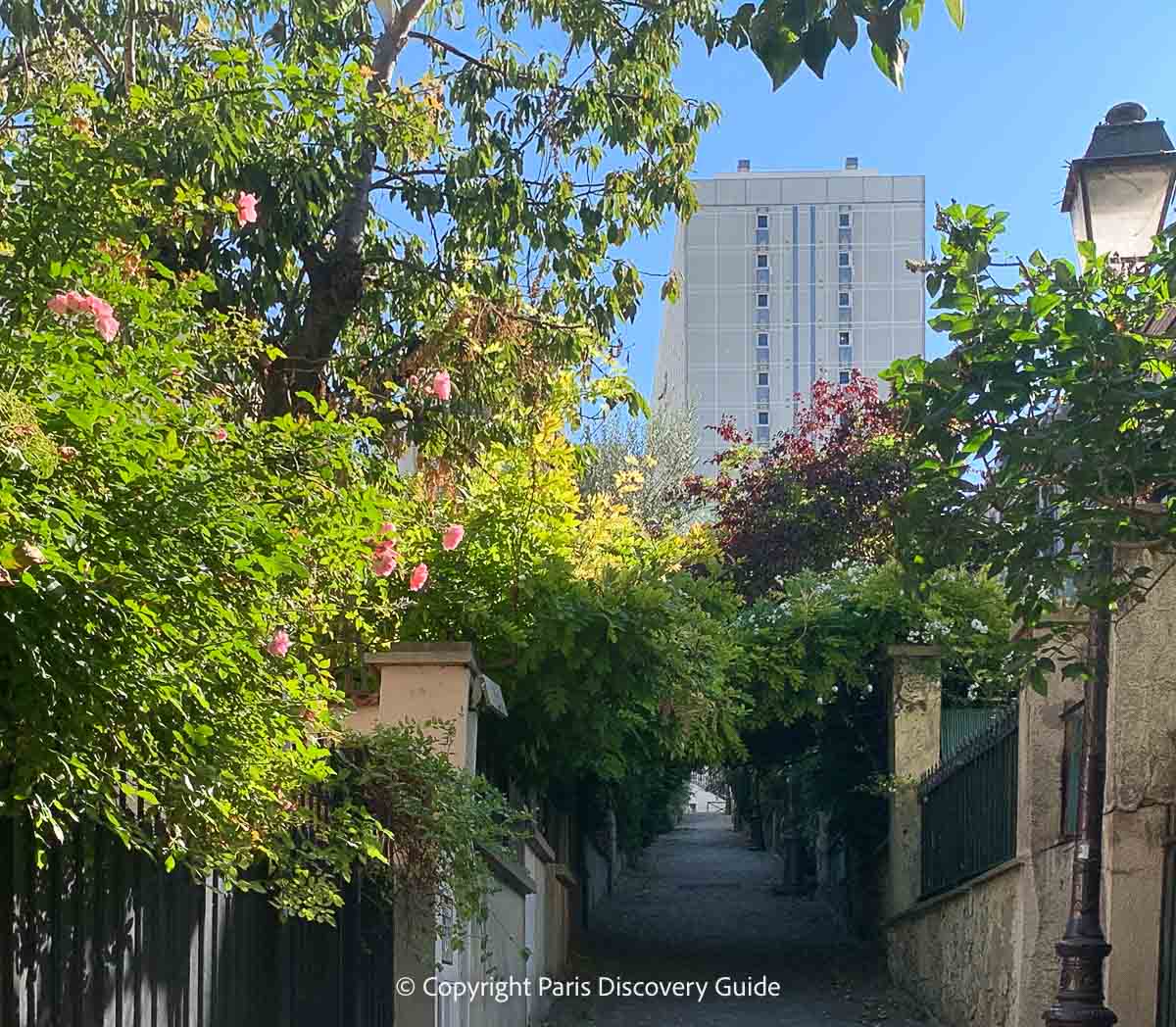
Mouzaia is a tiny but charming neighborhood of about 250 small cottages and townhouses built by developers in the late 1800s. They cluster along a small grid of around 20 private 10-foot wide cobblestone lanes branching off from Rue de Mouzaia on the site of former gypsum quarries dating back to the Middle Ages.
On a quiet summer day, the fragrance from climbing roses spilling over the street-side walls scent the air in this quiet, peaceful have.
Mouzaïa Location
- 19th arrondisssement, Rue de Mouzaia between Rue de la Liberté and Rue des Lilas; Metro: Danube, Botzaris, Pré-Saint-Gervais
Roses Blooming along Impasses in Charonne, 20th Arrondissement

I happened upon this charming cobblestone impassse (dead-end lane) in the Charonne neighborhood a few years ago while visiting artists' studios during the annual Artists of Pere Lachaise Open Studios event usually held in May.
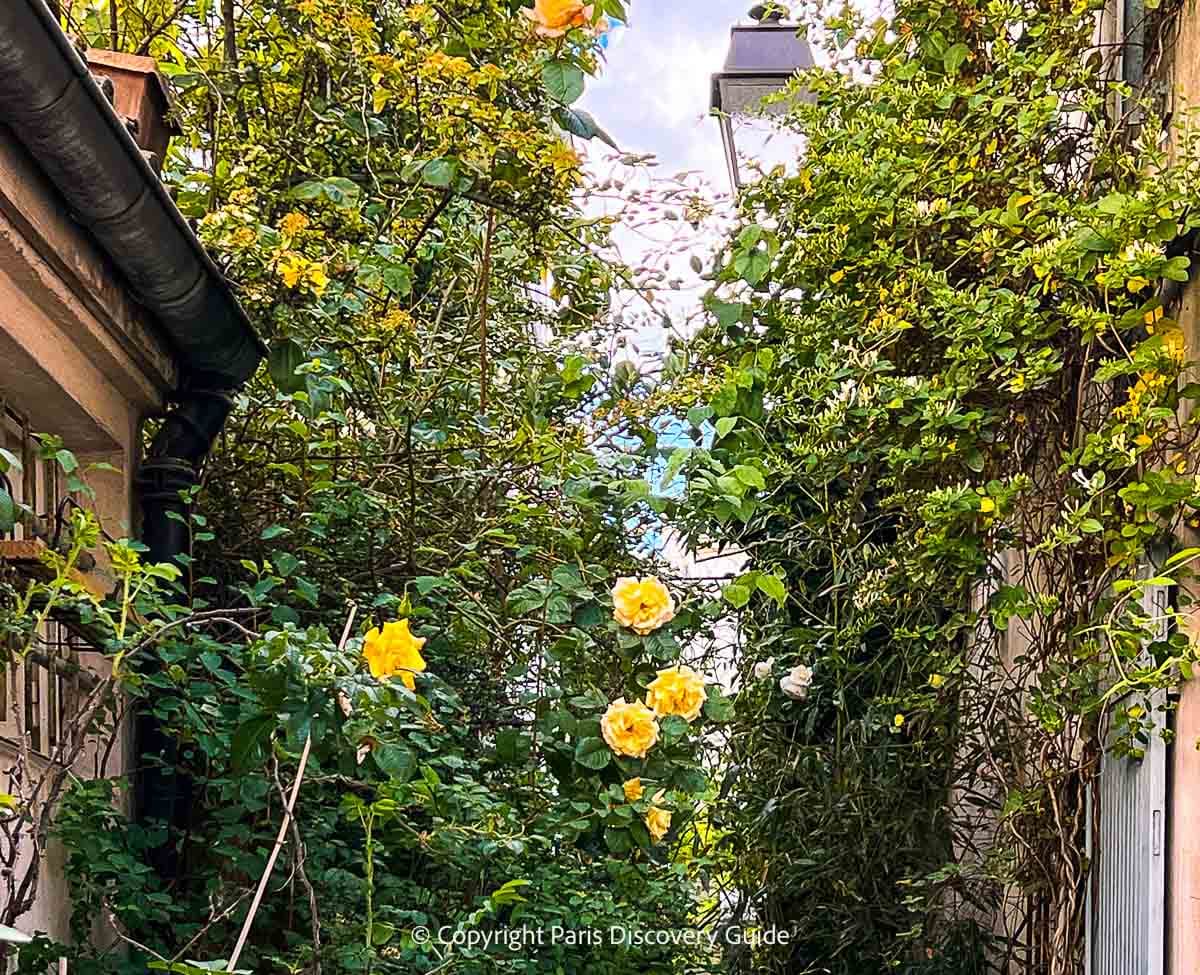
Open studies always provide a wonderful opportunity to explore authentic Parisian neighborhoods such as Charonne, once a small independent village to the south of Pere Lachaise Cemetery, before being merged into Paris by Napoleon III in 1860.
Today, Charonne retains its village charm. It's quiet and laid back, with numerous impasses and narrow lanes as well as small hidden parks and gardens tucked away on its slighly hilly terrain.
You can access Impasse Poule (and about a dozen other impasses) from Rue de Vignoles. From the street, Impasse Poule doesn't look particularly interesting, but walk down and the roses will soon come into sight.
Impasse Poule Location
- 20th arrondisssement, Impasse Poule, south of Rue des Vignoles; Metro: Buzenval or Avron, or walk up from the Nation RER/Metro station
And Last but Certainly Not Least, a Dazzling Rose Garden by the Palace of Versailles
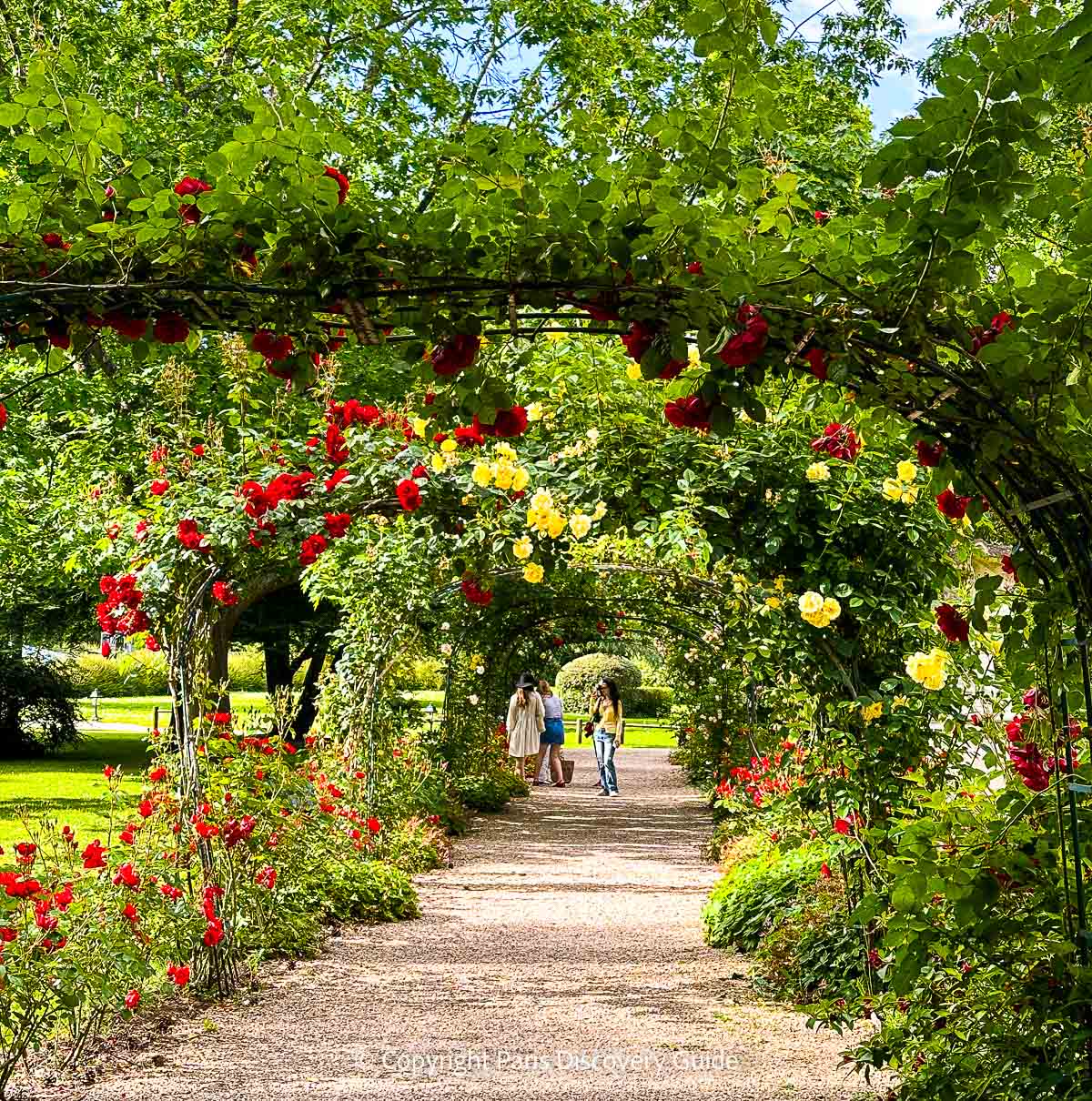
Although the Palace of Versailles is known for its magnificent garden near the chateau, the dazzling rose garden I'm going to share with you is actually on the grounds of the Waldorf Astoria Versailles-Trianon Palace hotel tucked away in a secluded spot on a corner of the Estate between the palace and the Grand Trianon.
I stayed there somewhat by accident (translation: I waited too long to book and every hotel was full - but fortunately the Waldorf had a last-minute cancellation). I had a ticket for Versailles' fantastic Night Fountains and Fireworks Show and wanted to enjoy every last moment without running to catch the last train back to Paris.
I expected the hotel to be wonderful (and it was!), but the best surprise was the large and magnificent rose garden filled with blossoms of every color.
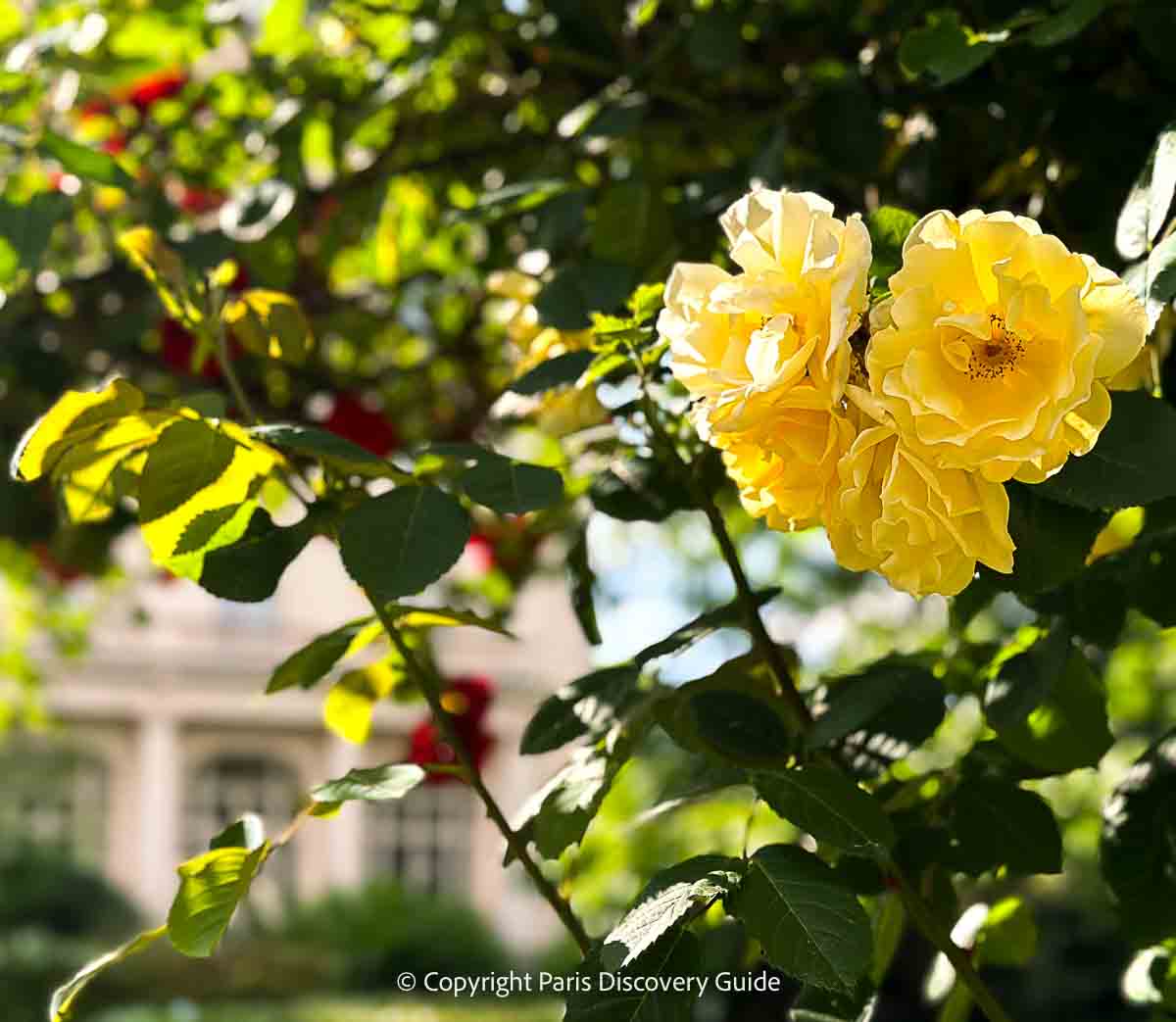
The Waldorf's manager told me that they get lots of bookings for weddings in their rose garden. It's hard to imagine a more perfect place.
So if you're planning a visit to Versailles and want to make the most of your day without rushing back to the city, consider booking at the Waldorf so that you can also enjoy the rose garden. Just don't wait until the last minute to book!
More about hotels near Versailles Palace
More Rose Gardens near Paris
Finally, if you love roses and don't mind venturing a bit beyond Paris, here are two more gardens you should not miss:
- Rosaraie du Val-de-Marne (sometimes called Rosaraie de l'Hay, a spectacular garden covering almost 4 acres with over 13,000 rose bushes including 3,200 species and varieties, charming latticed trellises and benches set around curving gravel paths, and romantic urns and sculptures.
Location: L'Haÿ les Roses, Rue Albert Watel, Val-de-Marne, France (about 5 miles south of Paris)
Open: Early May - late September
Admission: A small entrance fee is charged
Website - Parc Bagatelle Rose Garden, where 10,000 rose bushes from 1,200 different species and varieties bloom in gardens in front of a 19th century Orangerie where bulbs, irises, peonies, and other perennials add to the charm; if you go, be sure to check out the small chateau, water features complete with grottos and waterfalls, a pagoda, a reflecting pool, and peacocks.
Location: Route de Sèvres in Bois de Boulogne, on the far western side of the 16th arrondissement
Open: Daily; 9:30am to 8pm (April 1 - September 30) or 5pm (October 1 - March 31)
Admission: A small entrance fee is charged
Website
More Articles about Paris Travel
- Where to stay in Paris in the spring
- What to do on your first day in Paris?
- Top Paris attractions
- How to skip the lines at Paris's most popular attractions
- Paris Museum Pass - How much money and time can you save with it?
Need a Paris Hotel or Apartment for Your Visit?
Use this hotel map to find hotels and apartments during your travel dates:


